
The Project Gutenberg EBook of Hocus Pocus, by Henry Dean
This eBook is for the use of anyone anywhere in the United States and most
other parts of the world at no cost and with almost no restrictions
whatsoever. You may copy it, give it away or re-use it under the terms of
the Project Gutenberg License included with this eBook or online at
www.gutenberg.org. If you are not located in the United States, you'll have
to check the laws of the country where you are located before using this ebook.
Title: Hocus Pocus
or The Whole Art of Legerdemain, in Perfection. By which
the meanest capacity may perform the whole without the
help of a teacher. Together with the Use of all the
Instruments belonging thereto.
Author: Henry Dean
Release Date: May 26, 2018 [EBook #57217]
Language: English
Character set encoding: UTF-8
*** START OF THIS PROJECT GUTENBERG EBOOK HOCUS POCUS ***
Produced by RichardW and the Online Distributed Proofreading
Team at http://www.pgdp.net (This file was produced from
images generously made available by the Library of Congress)

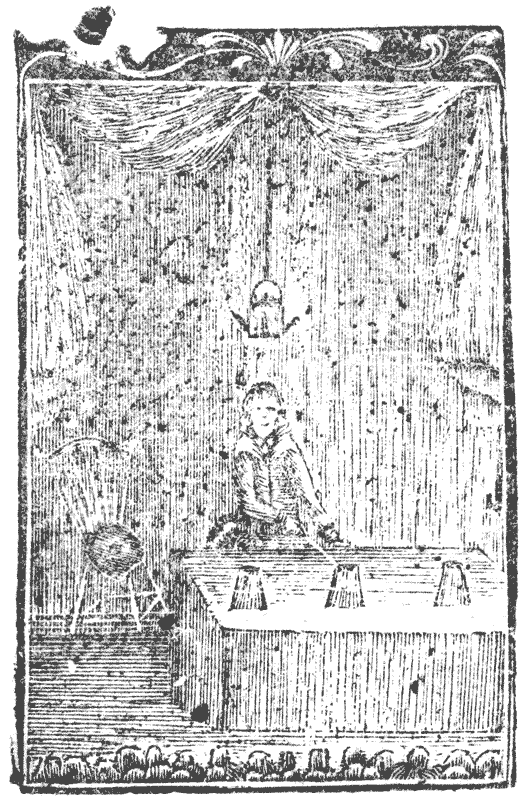
KIND READER,
Having in my former book of LEGERDEMAIN, promiſed you farther improvements, accordingly I have diſcovered herein to you the greateſt and moſt wonderful ſecrets of this ART, never written or publiſhed by any man before: therefore I do not doubt but herein you will find pleaſure to your full ſatisfaction; which is all my deſire.
Legerdemain is an operation whereby one may seem to work wonderful, impossible, and incredible things, by agility, nimbleness, and slight of hand. The parts of this ingenious art, are principally four.
1. He must be one of a bold and undaunted resolution, so as to set a good face upon the matter.
2. He must have strange terms, and emphatical words, to grace and adorn his actions; and the more to amaze and astonish the beholders.
3. And lastly, He must use such gestures of body, as may take off the spectators eyes from a strict and diligent beholding his manner of performance.
You must place yourself at the farther end of the table, and then you must provide yourself three cups, made of tin, and then you must have your black sticks of magic to shew your wonders withal; then you must provide four small cork balls to play with; but do not let more than three of them be seen upon the table.
Note. Always conceal one ball in the right hand, between your middle finger and ring finger: and be sure make yourself perfect to hold it there, for, by this means, all the tricks of the cups are done.
Then say as followeth.
Then take your four balls privately between your fingers, and so sling one of them upon the table, and say thus,
So then you have three balls on the table to play with, and one left between the fingers of your right hand.
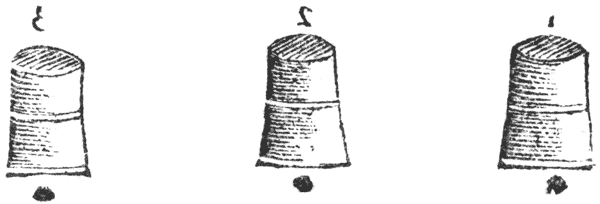
Lay your three balls on the table, then say, Gentlemen, you see here are three balls, and here are three cups, that is, a cup for each ball, and a ball for each cup. Then, taking that ball that you had in your right hand, (which you are always to keep private) and clapping it under the first cup, then taking up one of the three balls, with your right hand, seeming to put it into your left hand, but retain it still in your right, shutting your left hand in due time, then say, Presto, be gone.

Then taking the second cup up, say, Gentlemen, you see there is nothing under my cup; so clap the ball that you have in your right hand under it, and then take the second ball up with your right hand, and seem to put it into your left, but retain it in your right hand, shutting your left in due time, as before, saying, Verda, be gone.
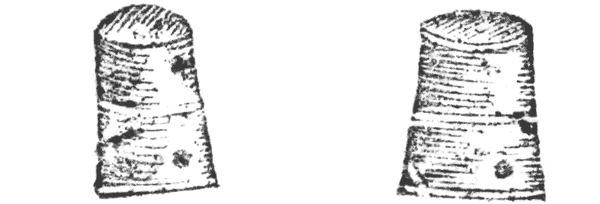
Then take the third cup, saying, Gentlemen, you see there is nothing under my last cup; then clapping the ball you have in your right hand under it, then take the third ball up with your right hand, and seeming to put it into your left hand, but retain it in your right; shutting your left hand in due time, as before, saying, Presto, make haste; so you have your three balls come under your three cups, as thus: and so lay your three cups down on the table.
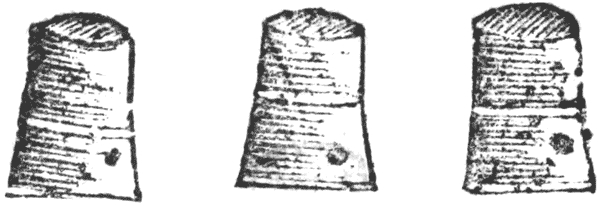
Then with your right hand take up the first cup, and there clap that ball under, that you have in your right hand; then saying, Gentlemen, this being the first ball, I will put it into my pocket; but that you must still keep in your hand to play withal.

So take up the second cup with your right hand, and clap that ball you have concealed under it, and then take up the second ball with your right hand, and say, this likewise, I take and put into my pocket.

Likewise, take up the third cup, and clapping the cup down again, convey that ball you have in your right hand under the cup, then taking the third ball, say, Gentlemen, this being the last ball, I take and put this into my pocket. Afterwards say to the company, Gentlemen, by a little of my fine powder of experience, I will command these balls under the cups again. As thus,

So lay them all along upon the table to the admiration of all the beholders.
Then take up the first cup, and clap the ball you have in your right hand under it, then taking the first ball up with your right hand, seem to put the same into your left hand, but retain it still in your right, then say, Vade, quick be gone when I bid you, and run under the cup.
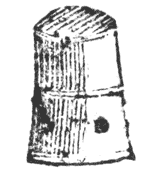
Then taking that cup up again, and flinging that you have in your right hand under it, you must take up the second ball, and seem to put it into your left hand, but retain it in your right hand, saying, Gentlemen, see how the ball runs on the table.
So seemingly fling it away, and it will appear as thus.
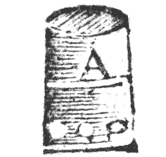
So taking the same cup again, then clapping the ball under again, as before, then taking the third ball in your right hand, and seem to put it under your left, but still retain it in your right, then with your left hand seem to fling it in the cup, and it will appear thus; all the three balls to be under one cup.

And if you can perform these actions with the cups, you may change the balls into apples pears, or plumbs, or to living birds, to what your fancy leads you to. I would have given you more examples, but I think these are sufficient for the ingenious, so that, by these means, you may perform all manner of actions with the cups.
Note. The artificial cups cannot well be described by words, but you may have them of me, for they are accounted the greatest secrets in this art: therefore, I advise you to keep them as such, for this was never known to the world before.
This is the magic lanthorn that has made so much wonder in the world, and that which Friar Bacon used to shew all his magical wonders withal.
This lanthorn is called magic, with respect to the formidable apparitions that by virtue of light it shews upon the white wall of a dark room. The body of it is generally made of tin, and of a shape of the lamp; towards the back part, is a concave looking glass of metal, which may either be spherical or parabolical, and which, by a grove made in the bottom of the lanthorn, may either be advanced nearer or put farther back from the lamp, in which is oil or spirit of wine, and the match ought to be a little thick, that when it is lighted, it may cast a good light that may easily reflect from the glass to the fore part of the lanthorn, where there is an aperture with the perspective in it, composed of two glasses that make the rays converge and magnify the object.
When you mean to make use of this admirable machine, light the lamp, the light of which will be much augmented by the looking glass at a reasonable distance. Between the fore-part of the lanthorn, and the perspective glass, you have a trough, made on purpose, in which you are to run a long, flat thin frame with different figures, painted with transparent colours upon glass; then all these little figures passing successively before the perspective glass, thro’ which passes the light of the lamp, will be painted, and represented with the same colours upon the wall of a darkroom, in a gigantic and monstrous manner.
By this Lanthorn you may shew what man, or woman, or birds, or beasts, and all sorts of fish that are in the sea: so if any gentleman has a desire to furnish themselves with one of these lanthorns, I have the best that can be made.
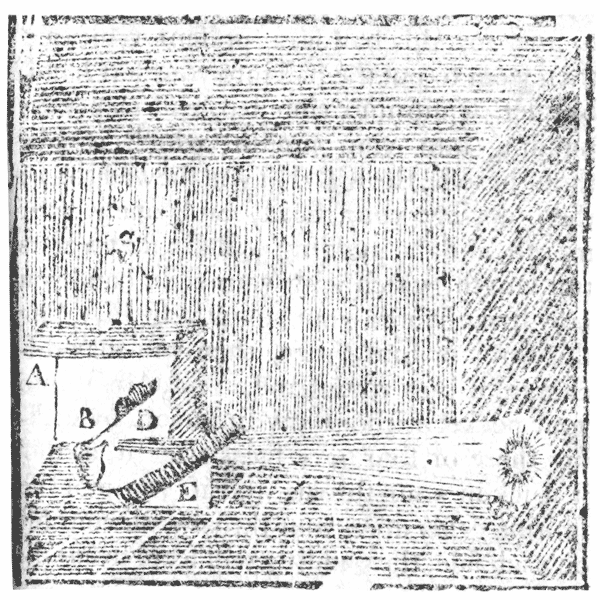
This pudding must be made of tin, consisting of twelve or thirteen little hoops made as in the figure following, so as they may almost seem to fall one through another, having little holes made at the biggest end thereof, that it may not hurt your mouth, hold this pudding (for so it is called) privately in your left hand, with the hole end uppermost, and with your right hand take a ball out of your pocket, and say, ‘If here is ever a maid, that has lost her maidenhead or an old woman that is out of conceit with herself, because her neighbours deem her not so young as she would be, let them come to me, for this ball is a present remedy:’ then seem to put the ball into your left hand, but let it slip into your lap, and clap your pudding into your mouth, which will be thought to be the ball that you shewed them; then decline your head, and open your mouth, and the pudding will slip down at its full length, which with your right hand you may strike it into your mouth again, doing this three or four times, then you may discharge it into your hand, and clap it into your pocket without any suspicion, by making three or four wry faces after it, as tho’ it stuck in your throat, and if you practise smiting easily upon your throat with your fist on each side, the pudding will seem to chink; as if it were flying there; then say, ‘Thus they eat puddings in High Germany, they fling it down their throats before their teeth can take possession of it.’

Desire any one of the spectators to lend you a knife, which when you get hold of, so that you may cover the whole with both hands, the end of the haft excepted, and setting the point to your eye, saying, “Some body strike it with your fist,” but nobody will, because it is so dangerous a thing; then setting your hand on the side of the table and looking about you, ask, “What will nobody strike it in?” in which time let the knife slip into your lap, then make as if you chop it hastily into your mouth, or to hold it with one hand, and to strike it in with the other nimbly, making three or four wry faces, saying, “Some drink, some drink,” or else, “Now let somebody put his finger into my mouth, and pull it out again,” some will cry, “You will bite me,” say, “I will assure you I will not:” then when he hath put his finger in, he will pull it out and cry, There is nothing; this is time sufficient to convey the knife into your pocket; then say, Why, you have your finger again: so, by this means, you may swallow knives and forks.
You must have a lock made for this purpose, according to the figure; one side of its bow must be immovable, as that marked with A, the other side is noted with B, and must be pinned to the body of the lock, as appears at E, I say it must be pinned that it may play to and fro with ease; this side of the bow must have a leg as at C, and then turn it into the lock; this leg must have two notches filled in the inner side, which must be so ordered, that one may lock or hold the two sides of the bow as close together as may be, and the other notch to hold the said part of the bow a proportionable distance asunder, that, being locked upon the cheek, it may neither pinch too hard, nor yet hold it so slight that it may be drawn off; let there be a key fixed to it, to unlock it, as you see at D, and lastly, let the bow have divers notches filled in it, so that the place of the partition, when the lock is shut home, will the least of all be suspected in the use of the lock; you must get one to hold a tester edge long between his teeth, then take another tester, and with your left hand proffer to set it edge-ways between a second man’s teeth, pretending that your intent is to turn both into which of their mouths they shall desire, by virtue of your words: which he shall no sooner consent to do, but you, by holding your lock privately in your right hand, with your fore-finger may flip it over his cheek, and lock it by pressing your fore-finger a little down, after some store of words, and the lock, having hung on a while, seem to pull the key out of his nose.
You may have those locks neatly made, at my house, near the watch-house, on little Tower-hill, Postern-row, a bookseller’s shop.
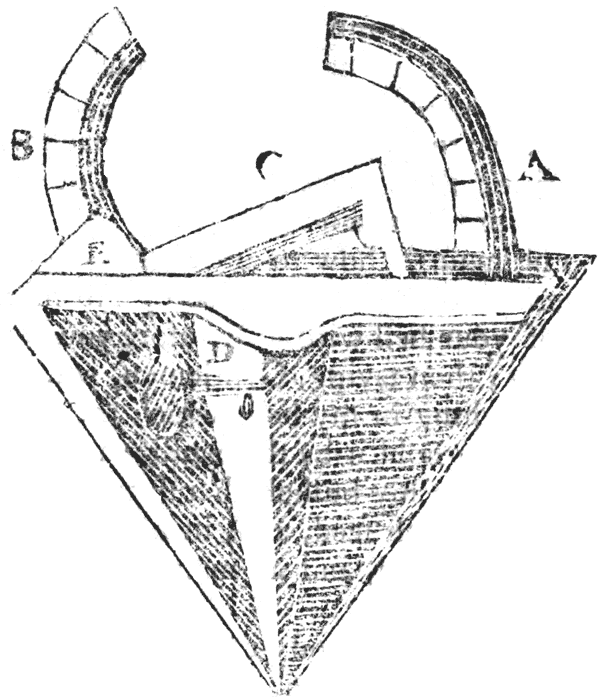
This feat may well be called magical, for really it is very amazing, if it be well handled. This device was never known to the public before.
This bushel must be turned neatly like unto the egg-boxes, so that they cannot find out where it opens, and you must have a false lid to clap on and off; upon that false lid glue some bird-feed, and then you must have a true lid made to clap neatly upon the false one, now you must have your artificial bell to shew with your bushel.
You may make your bell with wood or brass, your bell must be made to unscrew at the top, that it may hold as much seed as your bushel will when it is filled, and you must have the handle of your bell made with a spring, so as to let the seed fall down at your word of command.
The manner how to use them is as followeth: Note, you must be sure to fill the top of your bell with seed before you begin to shew; then saying, Gentlemen, you see I have nothing in my bell (which they cannot, if you hold it by the handle) nor have I any thing in my bushel, therefore I will fill my bushel with seed, and, in filling it, clap on the false lid, and no man can tell the contrary.
Then ask any body in the company to hold that seed in their hands and you will command it all under the magical bell; so clap the true lid on, and then ring your bell, and the seed will be gone out of your bushel into your bell, to the admiration of all the beholders.
If you cannot rightly conceive this by words, you may have them of the newest fashions, ready made, at my house.

You must have two rings made of silver, or brass, or what you please, of one bigness, colour, and likeness, saving that one must have a notch through, and the other must be whole, without a notch; shew the whole ring, and conceal that which hath the notch, and say, Now I will put this ring through my check, and privately slip the notch over one side of your mouth; then take a small stick which you must have in readiness, and slip the whole ring upon it, holding your hand over it about the middle of the stick; then bid somebody hold fast the stick at both ends; and say, see this ring in my cheek, it turns round; then, while you perceive them fasten their eyes upon that ring, on a sudden whip it out, and smite upon the stick therewith, instantly concealing it, and whirling the other ring, you hold your hand over round about the stick, and it will be thought that you have brought that ring upon the stick which was upon your cheek.
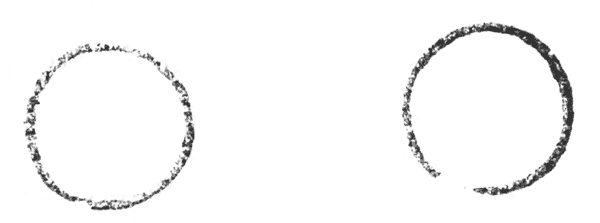
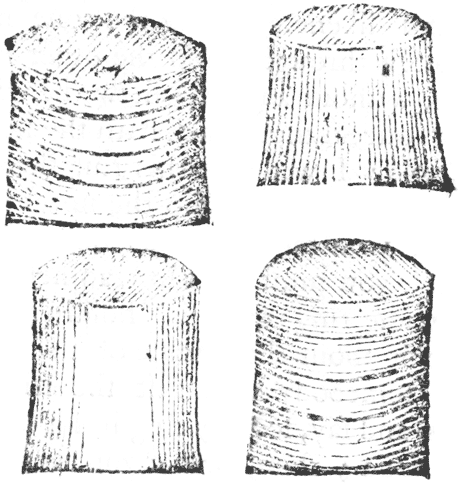
You must go and buy two or three yards of calico, or printed linen, and make a double bag, and on the mouth of the bag, on that side next to you, you must make four or five little purses, in which you must put two or three eggs in a purse; and do so till you have filled that side next to you; and have a hole made at one end of your bag, that no more than two or three eggs come out at once; then you must have another bag, like unto that exactly, that one must not be known from the other; and then put a living hen into that bag, and hang it on a hook on that side you stand. The manner of performing it is thus: take the egg-bag, and put both your hands in it, and turn it inside out, and say, Gentlemen, you see there is nothing in my bag; and, in turning it again, you must slip some of the eggs out of the purses, as many as you think fit, and then turn your bag again and shew the company that it is empty; and, in turning it again, you command more eggs to come out, and when all is come out but one, you must take that egg and shew it to the company; and then drop your egg-bag, and take up your hen-bag, and so shake your hen, pidgeon, or any other fowl. This is a noble fancy, if well handled.
Take a book seven inches long, and about five inches broad, and let there be forty-nine leaves, that is, seven times seven, contained therein, so as you may cut upon the edges of each leaf six notches, each notch in depth of a quarter of an inch, with a gouge made for that purpose, and let them be one inch distant; paint every thirteenth and fourteenth page, which is the end of every sixth leaf and beginning of every seventh, with like colours, or pictures; cut off with a pair of sheers, every notch of the first leaf, leaving only one inch of paper, which will remain half a quarter of an inch above that leaf; leave another like inch in the second part of the second leaf, clipping away an inch of paper in the highest place above it, and all notches below the same, and orderly to the third and fourth, and so as there shall rest upon each leaf only one nick of paper above the rest, one high uncut, an inch of paper must answer to the first directly, so as when you have cut the first seven leaves in such a manner as I have described, you are to begin the self same order at the eighth leaf, descending the same manner to the cutting the other seven leaves to twenty-one, until you are past through every leaf all the thickness of your book, &c.
This feat is sooner learn’d by demonstrative means, than taught by words of instruction; so, if any person wants to be furnished with these blowing books, they may have them at my shop on Little-towerhill, aforesaid.
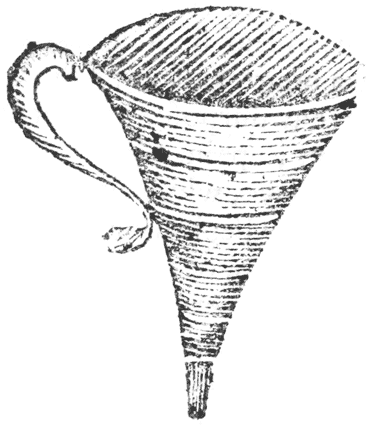
You must get a double funnel, that is, two funnels soddered one within the other, so that you may, at the little end, pour in a quantity of wine or water; this funnel you may have ready filled before-hand, with whatsoever liquor you please, and call for some of the same kind, then draw your funnel, and setting your middle finger into the bottom of it, bid some body, or else do it yourself, pour it full, and drink it up before them, and turn the broad end of the funnel downwards, saying, “Gentlemen, all is gone;” and in a trice turn yourself about, and in turning pronounce some terms of art, withdraw your finger from the narrow end, and let the liquor cut between the funnels, and it will be thought to be that which you drank out of the funnel, and so you may persuade them it is the same.
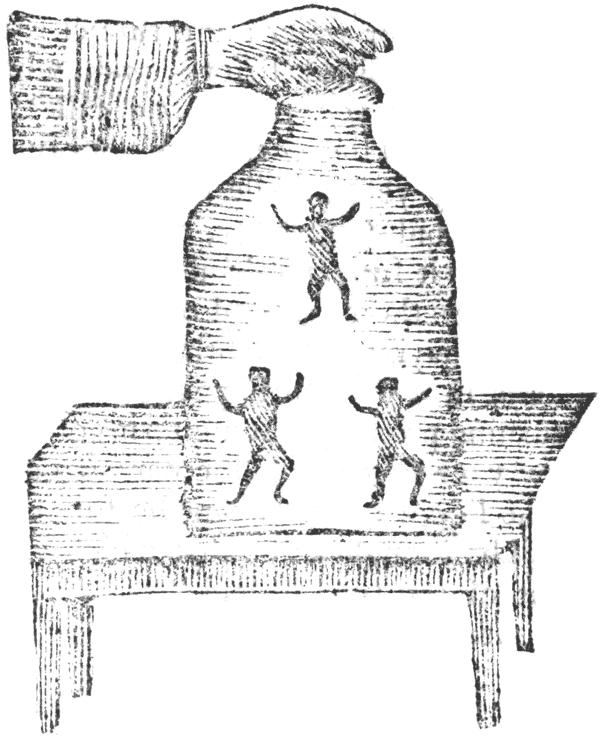
Take little figures of glass that are made hollow, of an inch and a half high, representing little boys, which may be had at the glass-blowers; these little images have a small hole in one of their legs, and are lighter than water; immerge them into the water contained in the glass A. B. this glass is about a foot or 15 inches high, and covered with a bladder which is tied fast over the top; a small quantity of air is to be left between the bladder and surface of the water; so, when you command them to walk down, press your hand hard upon the top, and they will immediately come down, and so you may make them dance in the middle of the glass, at your pleasure; and when you would have them to go up to the top, take your hand away, and they will walk up.
I hope this is sufficient for your understanding; if not, you may have the glass and figures of me.
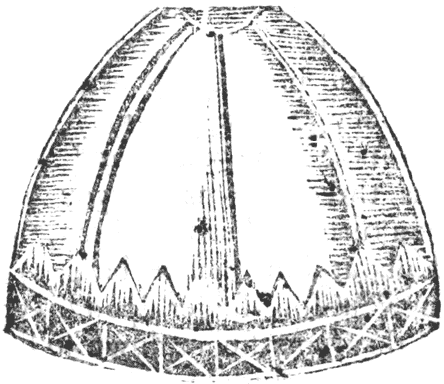
You must have the figure of a man made of wood, about the bigness of your little finger, the head whereof must be made to take off and put on at pleasure, by means of a wire that is in the neck: also, you must have a cloth cap with a little bag within to convey the head into; the bag must be neatly made that it may not easily be perceived: shew your man to the company, ‘Gentlemen, this I call my Bonus Genius;’ then shew the cap, saying, ‘This is his coat:’ say moreover, ‘Look now as stedfast as you can, nevertheless I will cozen you, for therefore am I come;’ then hold your cap above your face, and take your man in your right-hand, and put his head through the hole of the cap, saying, ‘Now he is ready to go on any message I have to send him, to Spain, or to Italy, or whether I will, but he must have somewhat to bear his charges,’ with that, pull out your right-hand from under the cap, and therewith, the body, but privately putting your right-hand into your pocket, as if you felt for money, where you may hide the body, and take out your hand and say, ‘There is three crowns for you, now be gone,’ then turn the head, and say, ‘But he will look about him before he goes;’ then say, setting your fore-finger upon his crown, ‘Just as I thrust my finger down so he shall vanish;’ and therewith by the assistance of your left-hand that is under the cap, convey his head into the little bag within the cap, then turn your cap about, and say, ‘See here he is gone;’ then take up your cap and hold it up again, throwing the head out of the little bag and say, ‘Hic mecus Genius,’ and in the mean time thrust the head through the hole of the cap, and holding the head by the wire, turn it about presently, and put the head into your pocket.
Note. Any person that is desirous to learn any part of this art, they may be taught by me.
H. Dean.
The conveyance of money is not much inferior to the balls, but much easier to do; the principal place to hold a piece of money is the palm of your hand, the best piece to keep is a tester, but with exercise all will be alike; except the money be very small, and then it is to be between the fingers, almost at the finger’s ends, whereas the ball is to be kept below, near to the palm; the money must not be of too large a circumference.
First, you must hold open your right-hand, and lay therein a tester or some big piece of money, then lay thereupon the top of your long left finger, and use words; and, upon a sudden, flip your right-hand from your finger wherewith you hold down the tester still therein, and suddenly, I say, drawing your right-hand through your left, you will seem to have left the tester there, especially when you shut, in due time, your left hand, which, that it may more plainly appear to be truly done, you may take a knife and seem to knock against it, so as it may make a great sound; this is pretty, if it is cunningly done, for both the ear and the eye are deceived by this device.
Another way to deceive the lookers on is, to do as before with a tester, and keeping a counter in the palm of your left-hand secretly, to put the tester secretly thereinto, which being retained still in the right-hand, when the left-hand is opened, the tester will seem to be turned into a counter.
He that hath once attained to the faculty of retaining one piece of money in his right-hand, may shew a hundred pleasant conceits by that means, and may reserve two or three as well as one; and so then you may seem to put one piece into your left-hand, and retaining it still in your right-hand, you may together therewith, take up another like piece, and so, with words, seem to bring both pieces together. Variety of tricks may be shown in juggling with money.
Also, you may take two testers, evenly set together, and put the same instead of one tester into a stranger’s hand, and then making as though you did put one tester in your left-hand with words, you shall make it seem that you convey the tester in your hand into the stranger’s hand; for when you open your said left-hand, there shall be nothing seen, and he opening his hand, shall find two testers, which he thought was but one. By this device, I say a hundred conceits may be shewed.
To keep a tester betwixt your fingers, serveth, especially for this and such like purposes; hold out your hand, and cause one to lay a tester upon the palm thereof; then shake the same up almost to your finger’s end, and putting your thumb upon it, you shall easily, with a little practice, convey the edge betwixt the middle and fore-finger, whilst you proffer to put it into the other hand; provided always that the edge appears not through the fingers on the backside; which being done, take up another tester, which you may cause another stander-by to lay down, and put them both together, either closely, instead of one into a stranger’s hand, or keep them still in your own hand, and after some words spoken, open your hands, and there being nothing in one hand, and both pieces in the other, the beholders will wonder how they came together.
You may with the middle or ring-finger of the right-hand, convey a tester into the palm with the same hand, and seem to cast it away, keeping it still, which, with confederacy, will seem strange: to wit, when you find it again, where another have bestowed the like piece, but these things without exercise cannot be done; therefore I will proceed to shew how things may be brought to pass with less difficulty, and yet as strange as the rest; being unknown, are marvellously commended, but being known, are derided and nothing at all regarded.
You shall see a juggler take a tester and throw it into a pot, or lay it in the midst of a table, and with enchanting words cause the same to leap out of the pot, or run towards him, or from him along the table, which will seem miraculous until you know how it is done; which is thus, take a long black hair of a woman’s head fastened to the rim of a tester, by the means of a little hole driven through the same with a Spanish needle, in like sort you may use a knife, or any small thing, but if you would have it go from you, you must have a confederate, by which means all juggling is graced and amended; this feat is the stranger if it be done by night, and a candle placed between the spectators and the juggler; for by that means their eyes are hindered from discerning the conceit.
A juggler also will sometimes borrow a tester and mark it before you, and seem to put the same into the midst of a handkerchief, and wind it so as you may the better see and feel it; then will he take the handkerchief and bid you feel whether the tester be there or not, and he will also require you to put the same under a candlestick, or some such like thing; then he will send for a bason of water, and holding the same under the table right against the candlestick, he will use certain words of enchantment, and in short you will hear the tester fall into a bason; this done, let one take off the candlestick, and the juggler take the handkerchief by a tossel and shake it, but the money is gone, which seemeth as strange a feat as any whatsoever, but being known, the miracle is turned to a bauble, for it is nothing else but to sew a tester into a corner of a handkerchief, finely covered with a piece of linen a little bigger than your tester, which corner you must convey instead of the tester delivered to you into the middle of your handkerchief, leaving the other in your hand or lap, which afterwards you seem to pull through the table, letting it fall into the bason.
Take a groat, or some lesser piece of money, and grind it very thin at one side, and take two counters and grind them, the one at one side; glew the smooth side of the groat to the smooth side of the counter, joining them so close together as may be, especially at the edges, which may be so filled as they shall seem to be but one piece, to wit, one side a counter and the other side a groat, then take a little green wax for that is softest, and therefore best, and lay it so upon the smooth side of the counter as if it do not much discolour the groat, and so will that counter, with the groat, cleave together as though they were glued, and being filled even with the groat and the other counter, it will seem so perfect, like an entire counter, that though a stranger handle it he cannot betray it; then, having a little touched your fore-finger and the thumb of your right-hand with soft wax, take therewith this counterfeit counter, and lay it openly upon the palm of your left-hand, in such sort as if you were to lay down the counter, wringing the same hard, so as you may leave the glewed counter, with the groat, apparently in the palm of your left-hand, and the smooth side of the waxed counter will stick fast upon your thumb, by reason of the wax wherewith it is smeared, and so you may hide it at your pleasure always; that you lay the waxed side downward, and the glewed side upward, then close your hand, and in, or after the closing thereof, turn the piece, and so instead of a counter, which they suppose to be in your hand, you shall seem to have a groat, to the astonishment of the beholders, if it be well handled. The juggler must not have any of his tricks wanting.
Put a little red wax, not too much, upon the nail of your longest finger, then let a stranger put a two-penny piece into the palm of your hand, and shut your fist suddenly, and convey the two penny piece upon the wax, which with use you may so accomplish as no man shall perceive it; then, and in the mean time, use words of course, and suddenly open your hand, hold the tips of your fingers rather lower than higher than the palm of your hand, and the beholders will wonder where it is gone; then shut your hand suddenly again, and lay a wager whether it be their or not, and you may either leave it there, or take it away at pleasure; this, if it be well handled, hath more admiration than any other feat of the hand. Note. This may be best done by putting the wax upon the two-penny piece, but then you must put it into your hand yourself.
Stick a little wax upon your thumb, and take a stander-by, by the fingers, shewing him the tester, and telling him you will put the same into his hand, then wring it down hard with your waxed thumb, and using many words, look him in the face, and as soon as you perceive him to look in your face, or on your hand, suddenly take away your thumb and close his hand, and it will seem to him that the tester remaineth; even as if you wring a tester upon one’s forehead, it will seem to strike when it is taken away, especially if it be wet; then cause him to hold his hand still, and with speed put into another man’s hand, or into your own, two testers instead of one, and use words of course, whereby you shall make the beholders believe, when they open their hands, that, by enchantment, you have brought both together.
It is necessary to mingle some merry pranks among your grave miracles, as in this case of money, to take a shilling in each hand, and holding your arms abroad, lay a wager that you will put them both into one hand without bringing them any nearer together; the wager being laid, hold your arms abroad alike a rod, and turning about with your body, lay the shilling out of one of your hands upon the table, and turning to the other hand; and so you shall win your wager: a knack more merry than marvelous.
Take a sheet of paper, and fold or double the same, so as one side be a little longer than the other, then put a counter between the two sides of the leaves of the paper, up to the middle of the top of the fold, hold the same so as it be not perceived, and lay a groat on the outside thereof, right against the counter, and fold it down to the end of the longer side, and when you have unfolded it again, the groat will be where the counter was; so that some will suppose that you have transformed the money into a counter; and with this many tricks may be done.
Take two papers three inches square a-piece, divided into two folds, into three equal parts, at either side, so as each folded paper remains one inch square; then glue the back side of the two together, as they are folded, and not as they are opened, and so shall both papers seem to be but one, and which side soever you open, it shall appear to be the same, if you have handsomely the bottom, as you may well do with your middle finger, so as if you have a groat in one hand, and a counter in the other, you having shewed but one, may, by turning the paper, seem to change it; this may be the best performed by putting it under a candlestick or a hat, and with words seem to do the feat. This is no inferior trick.
I having now bestowed some waste money among you, I will set you to cards, by which kind of witchcraft a great number of people have juggled away, not only their money, but also their lands, their health, their time, and their honesty. I dare not as I could, shew the lude juggling that cheats practice, least it minister some offence to the well disposed; to the simple, hurt and losses, and to the wicked, occasion of evil doing; but I could wish all gamesters to beware, not only of cards, but also of what dice they play withal; but especially with whom, and where they exercise gaming, and to let dice pass as a thing whereby a man must be inevitably cozened: one that is skilful in making bum cards, may undo hundreds of wealthy men that are given to gaming; for if he hath a confederate present, either of the players or standers-by, the mischief cannot be avoided; if you play among strangers, beware of him that seems simple or drunken, for under their habit the most specious cozeners are presented, and while you think by their simplicity and imperfections to beguile them, and thereby perchance are pursuaded by their confederates, which you take to be your friends, you will be then most of all deceived; beware also of the betters and lookers-on, and particularly, of them that bet on your side, whilst they look on your game without suspicion, they discover it by signs to your adversaries, with whom they bet, and yet are their confederates.
But in shewing feats and juggling with cards, the principal point consisteth in the shuffling them nimbly, and always keeping one card either at the bottom or in some known place of the stock, four or five cards from it; hereby you shall seem to work wonders, for it will be easy for you to see one card, which, though you be perceived to do, it will not be suspected, if you shuffle them well afterwards: and this note I must give you, that in reserving the bottom card, you must always whilst you shuffle, keep him a little before or behind all the cards lying underneath him, bestowing him, I say, either a little beyond his fellows before, right over the fore finger or else behind the rest, so as the little finger of the left hand may meet with it, which is the easier, the readier, and better way: in the beginning of your shuffleing, shuffle as thick as you can, and in the end throw upon the stock the nether card, with so many more at the least as you would have preserved for any purpose, a little before or a little behind the rest, provided always that your fore-finger (if the pack lay behind) creep up to meet with the bottom card, and when you feel it, you may then hold it until you have shuffled over the cards again, still leaving your kept card below: being perfect herein, you may do almost what you list with cards by this means, what pack soever you use, though it consisteth of eight, twelve, or twenty cards, you may keep them still together unserved next to the card, and yet shuffle them often to satisfy the curious beholders. As for example, and for brevity sake, to shew divers feats under one.
Make a pack of these eight cards, to wit, four knaves and four aces, and although the eight cards must be immediately together, yet must each knave and ace be evenly set together, and the same eight cards must lie also in the lowest place of the bunch, then shuffle them so always at the second shuffling, or, at leastwise, at the end of your shuffling the said pack, one ace may lay undermost, or so as you may know where he goeth and lieth always: I say, let your aforesaid pack, with three or four cards more, lie unseparable together; immediately upon, and with that ace; then using some speck, or other device, and putting your hands with the cards to the edge of the table, to hide the action, let out privately a piece of the second card, which is one of the knaves, holding forth the stock in both your hands, and shewing to the standers-by the nether card, which is the ace, or kept card, covering also the head or piece of the knave, which is the next card, and with your fore-finger draw out the same knave, laying it down on the table; then shuffle them again, keep your pack whole, and so have your two aces lying together in the bottom; and to reform that disordered card, and also to grace and countenance that action, take of the uppermost card of the bunch, and thrust it into the midst of the cards, and then take away the nethermost card, which is one of your said aces, and bestow him likewise; then may you, being as before, shewing another ace, and instead thereof lay down another knave and so forth, until, instead of your aces, you have laid down four knaves, the beholders all this while thinking that there lies four aces on the table, are greatly amused, and will marvel at the transformation: you must be well advised in shuffling of the bunch lest you overshoot yourself.
When you have seen a card privately, or as though you marked it not, lay the same undermost, and shuffle the cards as before you are taught, till your card be again at the bottom; then shew the same to the beholders, bidding them to remember it; then shuffle the cards, or let any other shuffle them, for you know the card already, and therefore may at any time tell them what card they saw, which nevertheless must be done with caution, or shew of difficulty.
If you can see no card, or be suspected to have seen that which you mean to shew, then let a stander-by shuffle, and afterwards take you the cards into your hands, and having shewed them, and not seen the bottom card, shuffle again, and keep the same cards, as before you are taught; and either make shift then to see it when their suspicion is past, which may be done by letting some cards fall or else lay down all the cards in heaps, remembering where you laid the bottom card; then espy how many cards lie in some one heap, and lap the slap where your bottom card is, upon that heap, and all the other heaps upon the same, and so if there were five cards in the heap, whereon you laid your card, then the same must be the sixth card, which now you must throw out or look upon without suspicion, and tell them the card they saw.
Lay three cards at a little distance, and bid a stander-by be true and not waver, but think on one of the three, and by his eye you shall assuredly perceive which he thinketh: and you shall do the like if you cast down a whole pack of cards with the faces upwards, whereof there will be few or none plainly perceived, and they also court cards: but as you cast them down suddenly, so must you take them up presently, marking both his eyes, and the card whereon he looketh.
This is a wonderful fancy if it be well handled: as thus,
Take a pack of cards, and let any one draw any card that they fancy best, and afterward take and put it into the pack, but so as you know where to find it at pleasure; for by this time, I suppose you know how to shuffle the cards, and where to find any card when it is put into the pack; then take a piece of wax, and put it under the thumb nail of your hand, and then fasten a hair to your thumb, and the other end of the hair to the card, then spread the pack of cards open on the table, then say, “If you are a pure virgin the card will jump out of the pack,” then by your words or charms seem to make it jump on the table.
Take a nut, or a cherry stone; and burn a hole through the side of the top of the shell, and also through the kernel if you will, with a hot bodkin, or bore it with an awl, and with a needle pull out the kernel, so as the same may be as wide as the hole of the shell: then write the name of the card in a piece of fine paper, and roll it up hard, then put it into the nut or cherry stone, and stop the hole up with wax, and rub the same over with a little dust, and it will not be perceived; then let some stander-by draw a card, saying, ‘It is no matter what card you draw;’ and if your hands so serve you to use the card well, you shall proffer him, and he shall receive the same card that you have rolled up in the nut; then take another nut and fill it up with ink, and then stop the hole up with wax, and then give that nut which is filled with ink, to somebody to crack, and when he finds the ink come out of his mouth, it will cause great laughter. By this feat on the cards, great wonders might be done.
Take a pack of cards, let any gentleman draw a card, and let him put it in the pack again, but be sure that you know where to find it again at pleasure; then shuffle the cards as before taught, and then let another gentleman draw a card, but be sure that you let him draw no other but the same card as the other did draw, and so do till ten or twelve or as many cards as you think fit; when you have so done, let another gentleman draw another card, but not the same, and put that card into the pack where you have kept the other card, and shuffle them till you have brought both the cards together; then shewing the last card to the company, the other will shew the trick: By this means many other feats may be done.
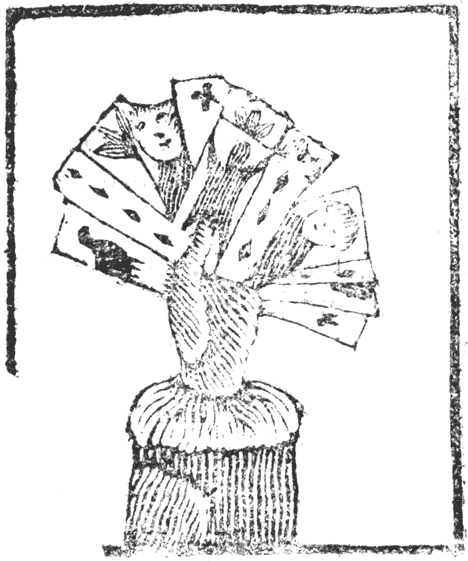
You must take a pack of cards and paint upon the back-side of one half of the pack what manner of figures that please your fancy best, as men, women, birds, flowers, &c. Then paint the other half, of the cards, viz. on that side where the spots are on, after the same manner you did the other half, so between them both, you will have a compleat pack of all pictures; and when you will perform this trick, you must shew the cards but half-way. This is one of the best tricks on the cards; and you may have them ready made at my house.
Make one plain loose knot with the two corner ends of a handkerchief, with seeming to draw the same very hard, hold fast the body of the said handkerchief, near to the knot, with your right hand, pulling the contrary end with your left hand, which is the corner of that which you hold; then close up handsomely the knot, which will be somewhat loose, and pull the handkerchief so with your right hand as the left hand end may be near to the knot, then will it seem to be a true and firm knot; and to make it appear more assuredly to be so, let a stranger pull at the end which you have in your left hand, while you hold fast the other in your right hand, and then holding the knot with your fore-finger and thumb, and the lower part of your handkerchief with your other finger, as you hold a bridle, when you would with one hand slip up the knot and lengthen the reins; this done, turn, your handkerchief over the knot with the left hand, in doing whereof you must suddenly slip out the end or corner, putting up the knot of your handkerchief with your fore-finger and thumb, as you would put up the aforesaid knot of your bridle: then deliver the same covered and wrapt within the midst of the handkerchief to one to hold fast, and after pronouncing of some words of art, take the handkerchief and shake it, and it will be loose.
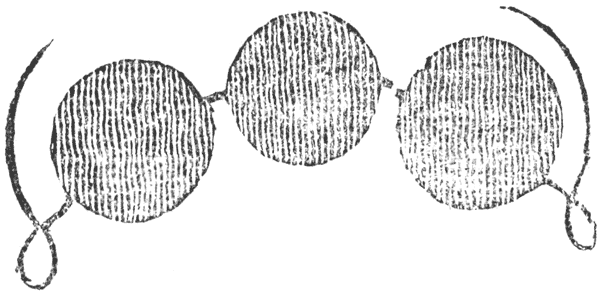
Take two little whipcords of two feet long a-piece, double them equally so as there may appear four ends; then take three button moulds, the hole of one of them must be bigger than the rest, and put one button mould upon the eye or bout of the one cord and another on the other cord, then take the button mould with the greatest hole, and let both the bouts be hidden therein; which may be the better done if you put the eye or bout of the one into the eye or bout of the other; then pull the middle button upon the same, being doubled over his fellow, so will the heads seem to be put over the two cords, you may loose them as you list, and make it seem manifest to the beholders, which may not see how they are done, but that the buttons are put upon the two cords without any fraud; then must you seem to add a more effectual binding of those buttons to the strings, and make one half of a knot with one of the ends of each side, which is for no other purpose, but that when the buttons be taken away, the cords may be seen in the case, which the beholders supposes them to be in before; for then you have made your half knots, which in any wise you may not double to make a perfect knot, you must deliver into the hands of some stander-by these two cords, namely, two cords evenly set to one hand, and two in the other, and then with a wager begin to pull off the buttons, which if you handle nimbley, and in the end cause him to pull his two ends, the two cords will shew to be placed plainly, and the buttons to have come thro’ the cords; but those things are so hard, and long to be described, that I will leave them, whereas I could shew greater variety.
I have promised you to write something of confederacy, that when you see or hear some fancy done, you shall be no stranger to it, but know how to do it as well as any juggler in England, for by confederacy mighty wonders are wrought, which seem incredible and impossible. Some will ask for what reason I do write these things and set them forth in such a manner, for they say, we know them already; my answer is, if you do, every one does not; therefore slight not simple things, for you that seem to be so cunning and so wary may be imposed on and deceived: what would an ingenious person give, or how far would he go to learn secrets? I myself would have gone twenty miles to have learnt the worst fancy in this book; I would have you take it in good part, and so I proceed to the chapter.
This must be done by confederacy, I won many a pint of wine by it; you must pretend you are grievously troubled with the tooth-ach, making wry faces and pretending a great deal of pain; then says your confederate, I will undertake to cure you in a quarter of an hour, it is a plain but a very safe and easy way, he then takes a thimble full of salt, puts it into a piece of paper, then says he, Hold this to your cheek on that side the pain lies, and it will be gone. You shaking your head at him, asking him, if he can find none to make sport with but you that are not disposed; he then proffers you to try his receipt, which, with seeming unwillingness take and hold it to your cheek a small time, then he will ask you if you find ease, you spitting much, say, Yes, truly I find it much abated; then he will say, to perfect it, lay down your paper upon the table, step into the yard and wash your mouth with a spoonful of cold water: Now (says he to the company, in your absence) You may see what conceit does, I will take out the salt, and put in the like quantity of ashes in the paper; laying it twisted as before in its place, then he coming in, takes up the paper again, and puts it into his mouth as before, the company will be laughing and fleering as tho’ you are ignorant, then privately convey the ashes away with the paper and another paper of salt like the former, as you must have in readiness as before, hold to your cheek, your confederate asking you, Well, what think you now? Why, indeed one would not have thought to have had so soon an alteration in a little; then will one or another say in company, Why, do you think you have salt in your mouth? Yes, I saw it taken out of the box; he will lay you a wager presently, that it is not salt, when by opening the paper, his folly is discovered, with no small sport to the company.
This likewise is done by confederacy, he that lays it down, says, What is it? and that is a sign it is a head; for he says, What is it now, and that is a sign it is a woman: cross and pile in silver is done the same way. By confederacy divers strange things are done; as to make a man, by muttering some words, to pull off his cloaths, and so dance naked; thus you may throw a piece of money into a pond, and bid a boy go to such a secret place where you have hid it, and he will bring it, and make them believe it is the same that you threw into the pond, and no other.
So let a confederate take a shilling and put it under a candlestick on a table at a good distance from you, then you must say, Gentlemen, you see this shilling, then take your hand and knock it under the table, and convey it into your pocket: then say, The shilling is gone, but look under such a candlestick and you will find it.
This feat is more for pastime than any thing else.
You must go and get you a post of about five or six inches long, and you must then get it turned hollow throughout, so that you may have a screw made just fit, and then put a needle at each end of the screw, and have two holes so contrived in the post that you may fasten two strings in the screw, so as when you pull one end of the string, the needle will run into your finger, and when you pull hold of the other end of the string, the needle will run into your thumb, which will cause great laughter to the campany. If these words are not sufficient for you to make one by, you may have them at my house ready made.
To do this you must have a piece of the same ready in your hand, the sample of that you intend to cut; then amongst other tricks by you, clap your hand upon the place you intend to cut, then drawing hollow by the false piece, cause it to be cut off, and gripping your hand, shew the hole from whence the piece came away, which is in your hand, which is done by pretending to feel in your pocket for a needle and thread to sew it up again: but drawing your hand out from your pocket, saying, I have no needle, but I have a charm will do as well; so muttering some words, bid them blow upon it, and pulling your hand from the place, does not a little satisfy the curiosity of the persons which thought they had been damnified.
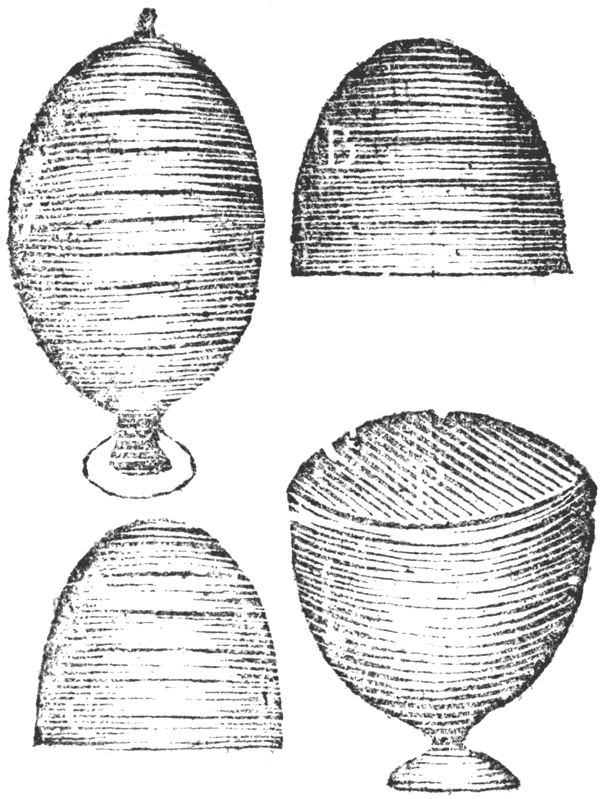
A, signifies the egg box, made in the fashion of two bee-hives put one upon another; B, the upper shell; C, the inner shell, covered over artificially with the skin of an egg; P the lower part of the shell-box; putting B, which is the outward shell, upon C, and both upon P, as it stands, makes the box perfect. To do this trick, call for an egg, then bid all standers-by look on it, and see that it is a real egg, setting the box on the table, upon the foot C, take off the upper part, B, C, with your fore-finger and thumb, then placing the egg in the box, say, You see it fairly in, and uncovering it again, likewise say, You shall see me fairly take it out, putting it into your pocket in their sight; open your box again and say, There is nothing, close your hand about the middle of your box, and taking B, by the bottom, say, There is the egg again, which appears to the spectators to be; so clapping that in again, and take the lid of C, in your finger and thumb, say, There it is gone again.
This feat is not for a bungler to shew.
Take sal armoniack half an ounce, camphire one ounce, aqua vitæ two ounces, put them into an earthen pot, in the fashion of a chamber-pot, but something narrow upon the top, then set fire to it, and the room will seem to them that are in to be all on fire; nay, themselves will slap their hair and clothes thinking they are all on fire, when there is no body hurt, unless it be with fright. Have a care of shewing it to women with child in the room, for yourself would be frighted if you did not know the trick.
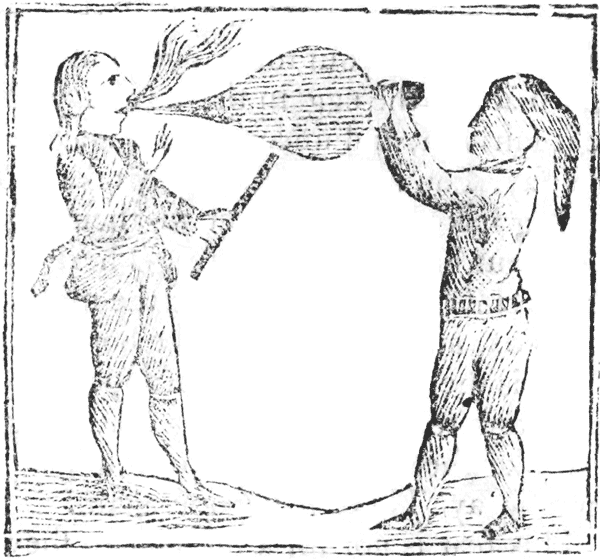
Anoint your tongue with liquid-storax, and you may put a pair of tongs into your mouth red hot, without hurting yourself, and lick them till they are cold, by the help of this anointment, and by preparing your mouth thus, you may take wood coal out of the fire, and eat them as you would bread, dip them into brimstone-powder, and the fire will seem more strange, but the sulphur puts out the coal, and shutting your mouth close puts out the sulphur, and so they champ the coals and swallow them, which they may do without offending the body; but if they were bound to eat nothing else, it would be a very sickly trade; and if you put a piece of lighted charcoal into your mouths you may suffer a pair of bellows to be a blowing in your mouth continually, and receive no hurt, but your mouth must be quickly cleaned, otherwise it will cause a salivation; it is a very dangerous thing to be done, and although those that practise it, use all the means they can to prevent danger, yet I never saw any one of these fire eaters that had a good complexion, the reason I could give, but it is known to the sons of art: some put bole-armoniack into this receipt: a cold thing, and spoils the whole composition, and so leaves out hamitatis and liquid storax; but let them beware how they use it.
Take half an ounce of camphire, dissolve it in two ounces of aqua vitæ, add to it one ounce of quick-silver, one ounce of liquid storax, which is the droppings of myrrh, and hinders the camphire from firing, take also two ounces of hamitatis, a red stone to be had at the druggists, and when you buy it, beat it to powder in their great mortar, for it is so very hard, that it cannot be done in a small one; put this to the afore-mentioned composition, and when you intend to walk on the bar, you must anoint your feet well therewith, and you may walk over without danger: by this you may wash your hands in boiling lead.
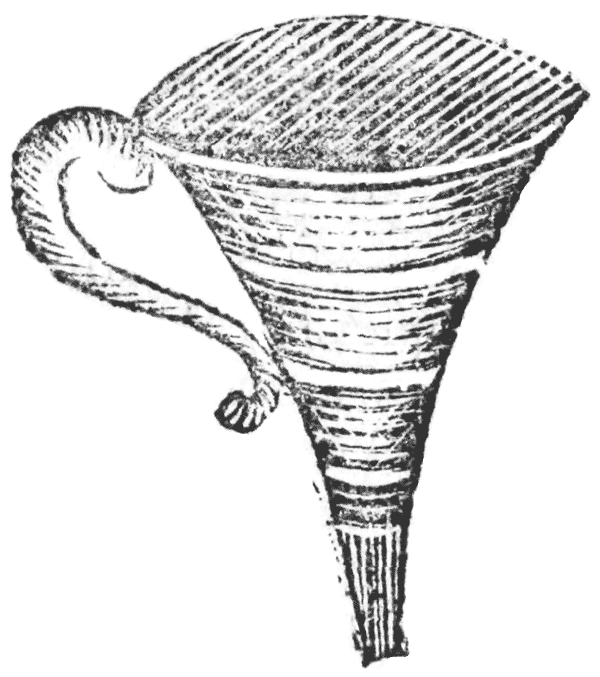
When you are in company, and intend to make mirth, have a pot full of water standing on a table, then take a piece of whale-bone about three inches long, let it be pretty stiff, it will spring the better; take also a new stiff card, and fold it down the middle long-ways, cut a hole through both folds at each end, half an inch or more from the ends, put one end of the whale-bone in at one end of the card, bend it like a bow, then put the other end of the whale-bone into the other end of the card, set this into the pot, with two inches or more deep in water, then place the handle of your knife upon the uppermost part of the whale-bone, with the point upwards: use some words of art, as Presto vet, or Omporte.
Note, I have invented a new instrument to perform this fancy, which is to be admired by all ingenious persons.
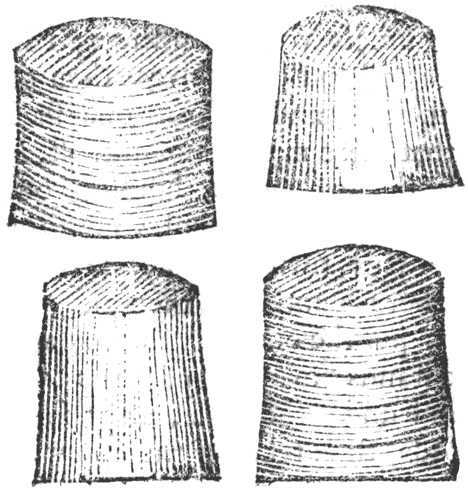
This melting box is another artificial slight, which is shewn as above, made in the fashion of a screw, that so the lips may hang without discovery; as thus, F is the out-part of the box; G the first in-part. H the second in-part; I a round case made of plush or leather, with a button on the top, and wide enough to slip on and off, half in the bottom of the box, F put a small quantity of quick-silver killed, which may be done with the shavings of pewter, or fasting spittle; in the second part, which is H, let there be six single pence, put these in the first or out-most part, then put G to H, and the box is perfect.
When you go to shew this trick, desire any in the company to lend you a sixpence, and you will return it safe again; but requesting withal, that none will meddle with any thing they see, unless you desire them, lest they prejudice you and themselves; then take the cup off the box, and bid any one see it and feel it, that there may be no mistrust, so likewise take the box entire, holding your fore-finger on the bottom, and your thumb on the upper part, turning it upside down, say, You see here is nothing; then putting in the sixpence, put the cup over the box again; as the box stands covered upon the table, put your hand under the table, using some canting words, then take off the cup with your fore-finger and thumb, so as you pinch the innermost box with it, and set it gently on the table; then put the killed quicksilver out of lower part into your hand, turning the box with the bottom upward and stirring it about with your finger, ‘Here you see it melted, now I will put it in again and turn it into six single pence;’ suddenly take the cap as you took it off, returning it again, bid them blow on it; then take off the cap as you did before, only pinching the uppermost lid in it, and setting it upon the table, hold the box at the top and bottom with your fore-finger and thumb, then put the six single pence, after they are viewed and seem to be so, in again, and return the cap as before, saying, Blow on it if you would have it in the same form you gave it me, then taking the cup by the button, holding the box as before, put out the six-pence and return the box into your pocket. This is a very good slight, if well performed, which is done by often use.
You must take a little piece of phosphorus, about the bigness of a pin’s head, and with a piece of tallow, stick it on the edge of the drinking-glass, and then take the candle lighted and blow it out; and apply it to the glass, it will immediately light. This is the preparation that Cromwell used to fire off his cannon withal, very amazing to behold; you may write with it on a paper, some horrible words or other, and it will appear frightful to the beholders: also, you may take a piece as big as a pin’s head, and rub it on a piece of paper, and it will be soon all on a flame.
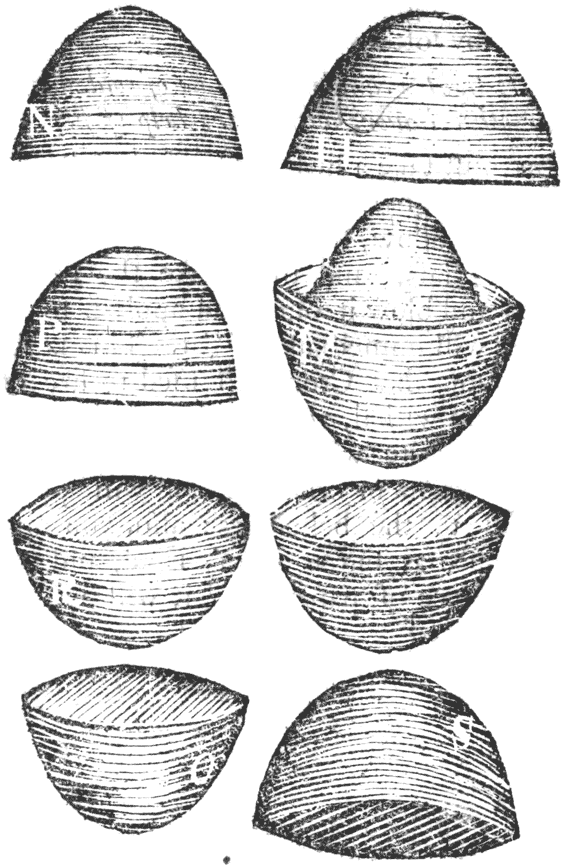
This is a trick not inferior to the best that is shewn with boxes; it is a box made of four pieces, and a ball so big as is imagined to be contained therein: the ball serves in the same nature, as the egg does in the egg box, only to deceive the hand and eye of the spectators. This ball, made of wood or ivory, is thrown out of the box upon the table, for everyone to see that it is substantial, then putting the ball into the box, and letting the standers-by blow on the box, taking off the upper shell with your fore-finger and thumb, there appears another, and of another colour, as red, blue, yellow, or any variety of colours upon each ball that is so imagined to be, which indeed is no more than the shell of wood ingeniously turned and fitted for the box, as you may see in the figures above.
L, the out-shell of the globe taken off the figures; M, N, an inner shell; O, the cover of the same; P, the other inner shell; Q, the cover of the same; R, the third shell; S, that which covers it. These globes may be made with more or less varieties, according to the desire of the practitioner.
Take a pack of cards, and after you have shuffled them, or let another shuffle them, lay them down upon the table before you, with their backs uppermost, then say, ‘Now I will tell you the names of all the rest of the cards in the pack, except one, before I see them;’ having said so draw off the uppermost cards, and say, ‘This is my Hocus Pocus. This is he by whose assistance I shall discover all the rest of the cards in the pack; I care not what he is, for I can make any of them serve for the same purpose.’ Then put him to your mouth, as tho’ you charmed him, and repeat some cramp words; and taking off the next card from the pack, say, Here is the —— naming your Hocus Pocus, and having seen him, lay him down.
You shall see a juggler take four kings in his hand, and apparently shew you them, then after some words and charms, he will throw them down upon the table, taking one of the kings away, and adding but one other card, then taking them up again, and blowing upon them, will shew you them transformed into blank cards, white on both sides, then throwing them down as before, with their faces downwards, will take them up again, and blowing upon them, will shew you four aces. This trick, in my mind, is not inferior to any of the rest, and being not known, will seem very strange to the beholders, and yet after you know it, you cannot but say the trick is pretty. Now to do this feat, you must have cards made for the purpose, half cards we may call them; that is one half kings and the other half aces, so laying the aces one over the other, nothing but kings will be seen, and then turning the kings downwards, the four aces will be seen; but you must have two whole cards, one a king, to cover one of the aces, or else it will be perceived; and the other an ace, to lay over the kings, when you mean to shew the aces; then, when you would make them all blank, lay the cards a little lower and hide the aces, and they will appear all white. The like you may make of four knaves, putting upon them the four fives; and so of the other cards.
To do this, you must first privately drop a drop of water or beer about the bigness of a two-pence upon the table before you, were you sit, then rest your elbows upon the table so as the cuffs of your sleeves may meet, and your hands stick up to the brims of your hat; in this posture your arms will hide the drop of water from the company; then let any one take the cards and shuffle them, and put them into your hands; also let them set a candle before you, for this trick is best done by candle light, then holding the cards in your left hand, above the brim of your hat, up close to your head, so as the light of the candle may shine upon the cards, and holding your head down; so in the drop of water, like a looking-glass, you shall see the shadow of all the cards before you; draw then the fingers of your right-hand along upon the cards, as though you felt the spots, name the cards, and then lay him down. Thus you may lay down all the cards in the pack, one by one, naming them before you lay them down, which will seem very strange to the beholders, who will think that you have felt them out.
Let any man take a card out of the pack, and note him: then take part of the pack in your hand, and lay the rest down upon the table; bidding him lay his noted card upon them; then turning your back towards the company, make as though you were looking over the cards in your hand, and put any card at the fore-side; and whilst you are doing this privately, wait the cards being laid out in heaps, to find what the bottom cards are. Bid any one take four cards of the same number, viz. 4 aces, 4 duces, 4 trays, 4 fours, or any other number not exceeding 10, (for he must not take court cards) and lay them out; then take the remaining cards (if any such there be) and divide their number by 4, and the quotient shall be the number of spots of the 4 card: if 12 cards remain, then on each bottom card ware trays, and if there be no remaining cards, then the four bottom cards are four aces.
Bid any one take the whole pack of cards in his hand, and having shuffled them, let him take off the upper card, and having taken notice of it, let him lay it down upon the table with his face downwards, and upon it let him lay so many cards, as will make up the number of the spots on the noted card, 12 e. g. If the card which the person first took notice of, were a king, queen, or knave, or a single ten, bid him lay down that card with his face downwards, calling him ten, upon that card let him lay another, calling him eleven, and upon another, calling him twelve; then bid him take off the next uppermost card, saying, what is it? Suppose it were a 9, and laying it down on another part of the table, calling him 9, upon him lay another card, calling him 10, and upon him another, calling him 11, and upon him another, calling him 12; then let him look on the next uppermost card, and so let him proceed to lay them up in heaps, in all respects as before, till he has laid out the whole pack; but if there be any odd cards at the last, I mean, if there is not enough, to make up the last noted card 12, bid him give them to you; then to tell him the numbers of all the spots contained in all the bottom cards of the heaps, do thus, from the number for heaps subtracted 4, and multiply the remainder by 12, and to the product add the numbers of those remaining cards, which he gave you, if any remain, but if there were but four heaps, then those remaining cards alone, shew the number of spots sought.
Note, That you ought not to see the bottom cards of the heaps, nor should you see them laid out, or know the number of cards in each heap, it suffices if you know the number of heaps, and the number of the remaining cards, if any such there be; and therefore you may as well perform this feat standing in another room as if you were present, you must have a whole pack.
When any one has named what two cards he would have brought together, take the cards and say, Let us see whether they are here or not, and if they are, I will put them as far asunder as I can; then having found the two cards proposed, dispose them in the pack, and cause them to come together.
This trick would seem much more strange, when you have brought the proposed cards together, by laying them in heaps, you lay the heap wherein the proposed cards are at the bottom of the pack, and then shuffle the cards, cut them asunder somewhere in the middle, so the proposed cards will be found together in the middle of the pack, which will seem very strange to beholders.
To perform this, you must place the fellow on one side of the pond, and the cat on the other, then take a strong rope and tie about the fellow’s middle, and the other end of the rope tie to the cat, and then have the rope to reach farther behind some tree, and there let two lusty fellows have hold of the rope, and when the wager is laid, then whip the cat, whilst the two fellows behind the tree pull as hard as they can.
It is not one of the worst tricks to burn a thread handsomely and make it whole again, the manner whereof is this: take two threads or small laces, of one foot length a piece, roll up one of them round, which will be then about the bigness of a pea, put the same between your left fore-finger and your thumb, then take the other thread, and hold it forth at length betwixt your fore-finger and thumb of each hand, holding all your fingers daintily, as young gentlewomen are taught to hold up a morsel of meat; then let one cut asunder the same thread in the middle; when that is done, put the tops of your two thumbs together, and so shall you, with less suspicion, receive the piece of thread which you hold in your right-hand, into your left, without opening of your left finger and thumb; then holding those two pieces as you did before it was cut, let these two be also cut asunder in the midst, and they conveyed again as before, until they be very short, and then roll all those ends together, and keep that ball of thread before the other in the left hand, and with a knife thrust the same into a candle, where you may hold it until the said ball of thread be burnt to ashes; then pull back the knife with your right-hand, and leave the ashes with the other ball betwixt your fore-finger and thumb of your left hand together, take pains to rub the ashes till your thread be renewed, and draw out that thread at length which you had, all this while, betwixt your fore-finger and thumb. This is not inferior to any juggler’s trick, if it be well handled, for if you are so perfect in Legerdemain, as to bestow the same ball of thread and to change it from place to place, betwixt your other fingers, as may be easily done, then it will seem very strange.
By a device not much unlike the former, you may seem to cut asunder any lace that hangs about one’s neck, or any point, girdle or garter, and with a sham conjuration to make it whole, and close it together again: for the accomplishment whereof, provide if you can, a piece of the lace which you mean to cut, or at least a pattern like the same, one inch and a half long, and keeping it double privately in your left-hand, betwixt some of your fingers, near to the tips thereof, take the other lace which you mean to cut still hanging about one’s neck, and draw down your said left-hand to the bout thereof, and putting your own piece a little before the other, the end or rather middle whereof, you must hide betwixt your fore-finger and thumb, make the eye, or bout which will be seen of your own pattern; let a stander-by cut the same asunder, and it will be surely thought that the other lace is cut; which with words and fretting, you shall seem to renew, and make whole again. This if it be well handled, will seem miraculous.
As for pulling ribbons out of your mouth, it is somewhat a stale jest, whereby jugglers get money from maids by selling laces by the yard, putting into their mouth one round bottom, as fast as they pull out another, and at the exact end of every yard they tie a knot so as the same rests upon their teeth, they then cut off the same, and so the beholders are double and treble deceived, seeing as much lace as will fill a hat, and the same of what colour you list; to be drawn so by even yards out of your mouth, and yet the juggler to talk as though there were nothing in his mouth.
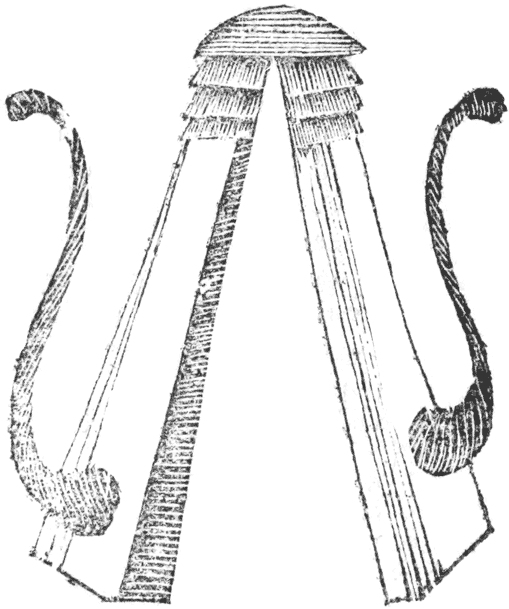
There is another juggling knack which they call the bridle, being made of two elder sticks, through the hollowness thereof is placed a cord, the same being put on the nose like a pair of tongs or pincers, the cord which goeth round about the same being drawn to and fro, the beholders will think the cord goes through your nose, very dangerously; the knots at the end of the cord, which do stay the same from being drawn out of the stick, may not be put at the very top, for that must be stopped up, but half an inch beneath each end, and so, (I say) when it is pulled, it will seem to pass through the nose, and then you may take a knife and seem to cut the cord asunder, and pull the bridle from your nose.

Take a bodkin so made as the haft being hollow, the blade thereof may slip thereinto as soon as you hold the point upward, seem to thrust it into your forehead, and so with a little spunge in your hand, you may bring out blood or wine, making the beholders think the blood or wine (whereof you may say you have drunk very much) runneth out of your forehead; then after shewing some countenance of pain and grief, pull away your hand suddenly, holding the point downward, and it will fall so out, as it will seem never to have been thrust into the haft, but immediately thrust that bodkin into your lap or pocket, and pull out another plain bodkin like the same, saying that conceit.

Make a bodkin, or a nail, which is all one; the blade thereof being sundered in the middle, so as the one part be not near to the other, by almost three quarters of an inch, each part being kept asunder with one small bout or crooked piece of iron, of the fashion described before, then thrust your tongue betwixt the aforesaid space, to wit, into the bout left in the bodkin blade, thrusting the said bout behind your teeth, and biting the same, it shall seem to stick so fast in, and through your tongue, that one can hardly pull it out. Also you must have another bodkin or nail, just like unto the false one, to serve to shew to the company.
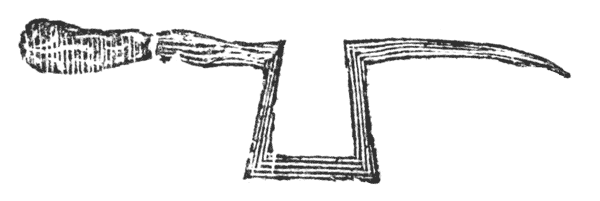
You must provide yourself with two knives, a true one, and a false one, and let them be so alike, that no one can tell one from the other, so when you go to shew this feat to the company, put the true knife into your pocket, and then take out the false one and clap it on your wrist undiscovered, and with a spunge make the knife bloody, and it will seem so much the more strange.
Take a hen or chicken, and thrust a nail, or a sharp pointed knife, through the midst of the head thereof, the edge towards the bill, so as it may seem impossible for her to escape death, then use some words, and pulling out the knife, lay oats before her, and she will eat and live, being nothing at all grieved or hurt with the wound, because the brain lieth so far behind in the head, as it is not touched, though you thrust your knife between the comb and it; and after you have done this, you may convert your speech and actions to the grievous wounding, and present recovery of your own self.
Put a piece of lead into one of the nether lids of your eye, as big as a tag of a point, but not so long, which you may do without danger, and with a little juggling stick, one end thereof being hollow, seem to thrust the like piece of lead under the other eye-lid, but convey the same, indeed, into the hollowness of the stick, the stopple or peg thereof may be privately kept in your hand until this feat be done, then seem to drive the said piece of lead, with the hollow end of the slick from the same eye, and so with the end of the said stick being brought along upon your forehead to the other eye, you may thrust out the piece of lead, and then shove it out of the eye; and some put it into both, but the first is the best; this is easily done, howbeit, being cleanly handled, it will deceive the sight of the beholders.
Take a pack of cards, and look out the four knaves, lay one of them privately on the top of the pack, and lay the other three down on the table, saying, here you see are three knaves got together, about no good you may be sure; then lay down a king beside them, saying, But here comes the constable and catches them together; Oh, (says he) have I caught you together? well, the next time I catch you together, I will punish you severely for all your rogueries. Oh, but (say they) you shall not catch us together again in haste for they conclude to run three several ways: Well, I will go here, (says one) so take one of the knaves and put him at the top of the pack: And I will go here, (says another) so put him at the bottom, Then I will go here, (says the other) so put him in the middle: nay, (says the constable) if you run, I will make sure of one, so I will follow the first, then take the king and put him at the top, and let any one cut the cards asunder two or three times, then deal, cut the cards one by one, and you shall find three knaves together, and the constable with them.
Note, This feat would be best done with a pack of cards that has two knaves of that sort, of which you put one in the middle.
To do this, you must have the picture in your sleeve, and by a swift slight return the card, and fetch out the picture with a back bending. The manner of doing this is better learnt by frequent trials than can be taught by many words; but if you would do this feat, and yet hold your hand straight, and unmoved, then you must peel off the spots or figures of a card, as thin as you can, and just stick it on the picture with something that will make it stick a little, then having shewed the spots or figure of the card, you may draw it off, and roll it up with your thumb, into a very narrow compass, holding it undiscovered between the inside of the thumb and the ball of your fore-finger, and so produce the picture, to the admiration of the beholders.
Take a card in your hand, and shew it fairly to the company, bidding them seriously observe it, then having a live bird in your sleeve, turn your hand on a sudden, drawing the card into your sleeve dexterously with your thumb and little finger, and giving a hard shake, the bird will come out or your sleeve into your hand, which you may produce, and then let fly, as you think convenient, and it will cause wonder in the spectators.
This feat is done by confederacy, in this manner; take and lay down, with their faces upwards, 3 cards, which may be an ace, a four, and a five, then go out of the room, but let your confederate stay and see which card was touched, then when any one has touched a card, let them call you into the room again, and if he touch the ace, let your confederate say, I will lay a penny that you cannot tell which card he touched; and if he touched the four, let him say, I will lay a groat, and if he touched the five, let him say, I will lay you a crown you cannot tell which card he touched; so by your confederate’s discourse, you will know which card he touched, nevertheless, you must pretend to find him out by smelling to them, as though the touch of his finger had left a scent on the card.
Take any number of cards, as 10, 12, and then holding them with their backs toward you, open four or five of the uppermost, and as you hold them out to their view, let any one note a card, and tell you, whether it be the first, second, or third from the top, but you must privately know the whole number of those cards you took; then shut up your cards in your hands, and take the rest of the pack and place upon them; then knock their ends and sides upon the table; so it will seem impossible to find the noted card, yet it may easily be done thus: subtract the number of the cards you held in your hand from 52, the whole number of the cards in the pack, and to the remainder add the number of the noted card; so the same shall be the number of the noted card from the top: therefore take off the cards one by one, smelling to them, till you come to the noted card.
You must fling your money on a table, and desire any body to tell ten pieces out on the table, when they have done they will say, there is ten. Note, you must have in readiness, privately concealed in your right-hand, five pieces, then you must tell the company that you always tell your money after every person, so telling down the money with your left-hand, and taking it up with your right, convey the five pieces to the ten, then ask if any body is desirous to hold them, and there will be enough to hold them, and be sure to hold them fast; that done, bid them to call for what number they please to think on between 10 and 15, and so let them call for what number they will, you know they have it in their hand, and when they open their hand, they are struck to admiration. But be sure not to forget your terms of art to amaze the beholders.
Another miracle may be shewed, touching counterfeit executions, namely, that with a dagger you shall seem to kill yourself, or at the least make an irrevokable wound in your belly, as in truth not long since a juggler caused himself to be killed at a tavern in Cheapside, from thence he went presently into St. Paul’s church-yard, and there died; which misfortune fell upon him thro’ his own folly, as being drunk, and forgetting his breast-plate, which he should have had for his defence. The device is this, you must prepare a pasteboard to be made according to the fashion of your belly and breast, the same must be by a painter, well coloured cunningly, not only like to your flesh, but with paps, navel, hair, &c. so as the same being handsomely trussed unto you, may shew to be your natural belly; then next to your true belly you may put a linen cloth, and thereupon a double plate, which the juggler that killed himself forgot; over and upon the which, you may place the false belly; provided always, that betwixt the plate and the false belly, you place a gut of blood, which blood must be of a calf, or of a sheep, but in no wise of an ox, or cow, for that will be too thick, then thrust, or cause to be thrust into your breast a dagger, so far as it may pierce thro’ you, which being pulled out a good distance from you, especially if you strain your body to swell, and thrust therewith against the plate. You must ever remember to use words, countenance, and posture, such a grace as may give a grace to the action, and move admiration to the beholders. Prize this as a valuable secret.
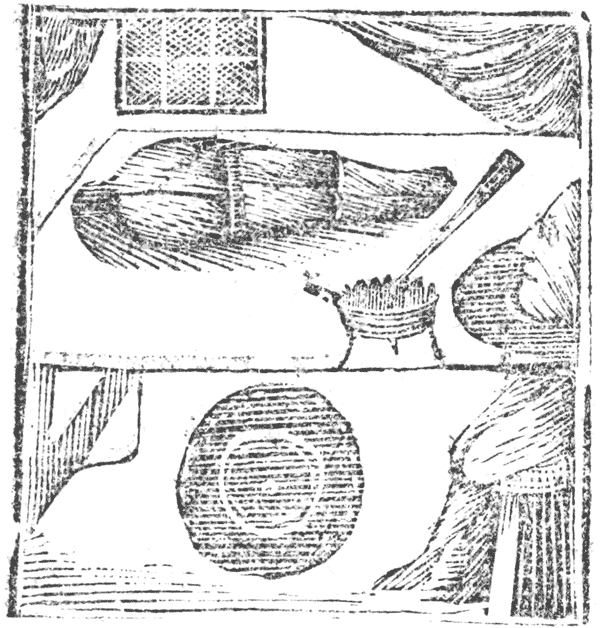
This is a noble action if it be well handled by a skilful hand. To shew this feat of execution, you must cause a board, a cloth, and a platter to be purposely made, and in each of them to be made holes fit for a body’s neck, the board must be made of two planks, the longer and broader the better, there must be left within half a yard of the end of each plank half a hole, so as both the planks being thrust together, there may remain two holes like to the holes in a pair of stocks, there must be made likewise a hole in the cloth, a platter also must be set directly over or upon one of them, having a hole in the middle thereof, of the like quantity, and also a piece cut off the same, so big as his neck, through which his head may be conveyed into the middle of the platter, and then sitting, or kneeling under the board, let the head only remain upon the board, in the frame; then to make the sight more dreadful, put a little brimstone into a chaffing-dish of coals, setting it before the head of the boy, who must gasp two or three times so as the smoke may enter his nostrils and mouth, which is not unwholesome, and the head presently will appear stark dead; if the boy set his countenance accordingly, and if a little blood be sprinkled on his face, the sight will be the stranger. This is commonly practised with a boy instructed for that purpose, who being familiar and conversant with company, may be known as well by his face, as by his apparel; in the other end of the table, where the like hole is made, another boy of the bigness of the known boy must be placed; having on his usual apparel, he must lean or lie upon the board; and must put his head under the board through the said hole, so as his body shall seem to lie on the one end of the board, and his head shall lie in a platter in the other end. There are other things which might be performed in this action, the more to astonish the beholders, which, because they require long descriptions, I omit; as, to put about his neck a little dough kneaded with bullocks blood, which, being cold will appear like dead flesh, and being pricked with a sharp round hollow quill, will bleed, and seem very strange, and many rules are to be observed herein; as to have the tablecloth so long and so wide as it may almost reach the ground. Note, suffer not the company to stay too long in the place.
Take four beer glasses, rub one in the inside with a piece of allum, let the second have a drop of vinegar in it, the third empty, and then take a mouthful of clean water, and a clean rag, with ground brasil tied close in it, the bulk may be no bigger than a small nut, which must lie betwixt your hind teeth, and your cheek, then take of the water out of the glass into your mouth, and return it into the glass that hath the drop of vinegar in it, which will cause it to have the perfect colour of sack; then turn it into your mouth again, and chew your rag of brasil, and squirt the liquor into the glass, and it will have the perfect colour and smell of claret; returning the brasil into its former place, take the liquor into your mouth again, and presently squirt it into the glass you rubbed with allum, and it will have the perfect colour of mulberry wine.
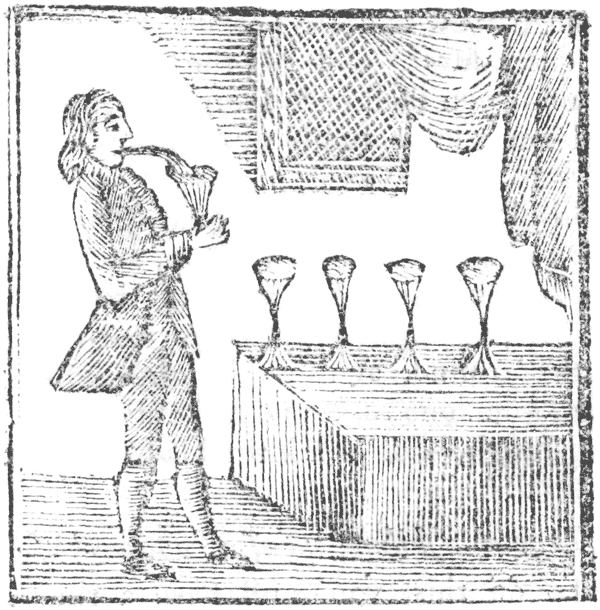
If you are drinking in company, or otherwise, that you are disposed to make sport; have ready a penny-worth of quick-silver, in a quill sealed at both ends with good hard wax, then cause an egg to be roasted or boiled, and take off a small bit of the shell of the narrow end, then thrust in your quill of quick-silver, and lay the egg on the ground; you shall have sport enough, for it will never leave tumbling about as long as there is any heat in it.
So likewise if you put quick-silver in a sheep’s bladder and blow it up, and when you have a mind to have sport, then go to the fire and warm the bladder, and fling it on the ground, and it will jump and skip about for a long time, and make all the company laugh, and think the bladder is bewitched.
To do this, you must have a ring of wire, such a one as you generally hang your keys upon, but less, or a curtain ring will do, so as it is no bigger than a shilling, then take a handkerchief, and put therein a shilling, twisting the handkerchief round, the form of the shilling will appear, then say, That you may be certain it is here, I will shew it you once more, that you may be sure it is in here, and taking out the shilling, convey the round wire into the handkerchief, which being twisted, will seem to be the shilling; the better to deceive, you may wrap the edge of the wire with your stick, then open the wire, draw it out, and produce the shilling which you have in the palm of your right-hand, saying, gentlemen, look you here is the shilling, you held the handkerchief very fast; in the mean time ask, who gave me this shilling? he who you had it of will soon answer, I, then thank him for it, saying, it is more than I have had given me this two days.
To do this, you must have a small piece of spunge with drink put in it privately, then unseen, place this behind your right-ear, but let not the spunge be too big or too full of liquor, least you be discovered; then taking a knife, stick it with the handle upwards in a table or stool, but observe when you go about these sports, to place your company before you, then bid them look, saying, ‘There you see is nothing of wet, either upon the handle, or upon the table’; so stretching your empty hand towards your ear, darting the point, saying, ‘Now some body cross my arm,’ and speaking some powerful words, as Jubio Bisco, then have you a fair opportunity to take this spunge into your hand, from behind your ear, and stretching forth your hand, squeeze it gently, and, after a little, harder, which makes it run the faster, to the amazement of the company, saying, thus could I do till I had drown’d you all; sprinkle a little in their faces, which will cause them to shut their eyes, whilst you convey away your spunge.
This feat can be done or performed only in winter, and at such times as snow may be had, and he that will shew it, must have in readiness, a handful of salt: the time serving, and the party being provided, let him call for a joint-stool, a quart pot, a handfull of snow, a little water, and a short staff; first let him pour a little water upon the stool, and upon it let him set the quart-pot, and put the snow into the pot, the salt also, but privately, then let him hold the pot fast with his left hand, and therewith churn the snow and salt in the pot, as if one would churn for butter, and in half a quarter of an hour the pot will freeze so hard to the stool, that you can scarcely with both hands pull it off from the stool.
You must have a piece of well dried match-cord, light it that it may have a good coal, then take a beer-bowl glass, and hold the match to the edge of the glass, have your finger ready wet, and when the glass as very hot, clap your finger to the hot place, and it will suddenly crack about a quarter of an inch downward, then keep the coal of the match the like distance from the end of the crack, and as it follows, so move your hand and cut it screw-fashion, otherwise it will not hold together, till you have it through the bottom, or like waves; when you have done it, and that is cold, as that it will be, take it by the foot, and turn it downwards, it will stretch so, that you may put your finger betwixt each cutting, then turn it up again, you may drink a glass of beer in it, and not spill a drop.
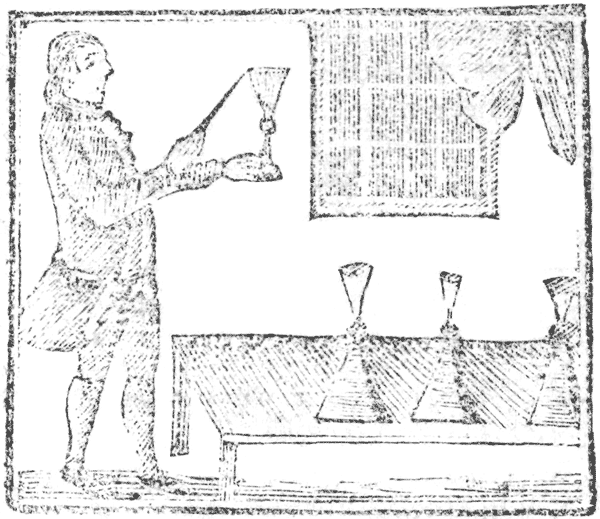
This feat must be performed with three bells, you must put one in your left sleeve, then put one bell into one hand, and another into the other hand; they must be little maurice bells; withdraw your hand, and privately convey the bell in your left hand into your right hand, then stretch both your hands abroad, and bid two men hold your hands fast, but first shake your hand and say, Do you hear them? the bell that is in your sleeve will not be known by the rattling, but that it is in your hands, then say, he now that is the greatest whore-master of you both shall have none at all; open your hands and shew them, and it will be thought you deal by magic art.
This is called Trouble-Wit, or Puzzle-Wit, which you please to call it, and indeed it is a very fine invention, by folding a sheet of paper as that, by art, you may change it into many several forms or fashions, take a sheet of marble Paper, fold it down the middle of the sheet long ways, when you have so done, turn down the edge of each fold outwards, the breadth of a single penny; then measure it as it is so folded into three equal parts with compasses, which makes six divisions in the sheet, let each third part be turned outward, and the other in course will fall right; then pinch it a quarter of an inch deep, in the manner as you pinch paper lanthorns, that is, in plaits like a ruff, so that when the paper lies pinched in its form, it is in the fashion represented by the figure A; when closed together like the figure B; unclose it again, and shuffle it with each hand, it resembles the shuffling of a pack of cards: close it, and take each corner inward with your fore-finger and thumb, it resembles a rose for a lady’s shoe, as is seen in the figure C, stretch it forth into the same form, and it resembles the cover for an Italian couch, as is shewed by the letter D; let go your fore-finger, at the lower end, and it resembles a wicket to a gate, or a portal to a nobleman’s door, as is shewed by the letter E; close it again, and pinch it at the bottom, spreading it on the top, and it is the fashion of a screen. For as it is shewed by the letter F. Pinch it half way, and open the top, and it is in the fashion of a shoe-maker’s cutting knife, which is shewn by the letter G; holding of it in that form, and with the thumb of your left-hand, turn out the next fold, and it is in form of a curry-comb, as it is shewed by the letter H. So that those who are resolved to learn to comb, do this feat, innocent, and diverting enough, both in city and country.
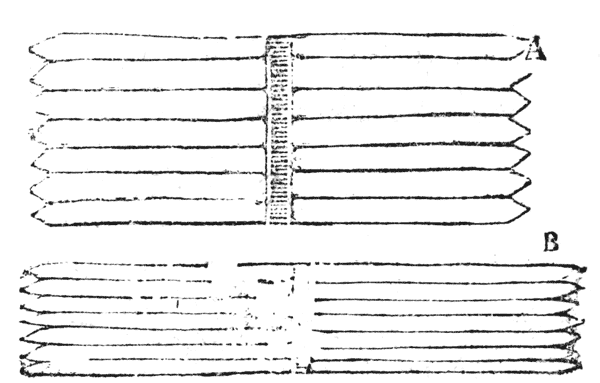
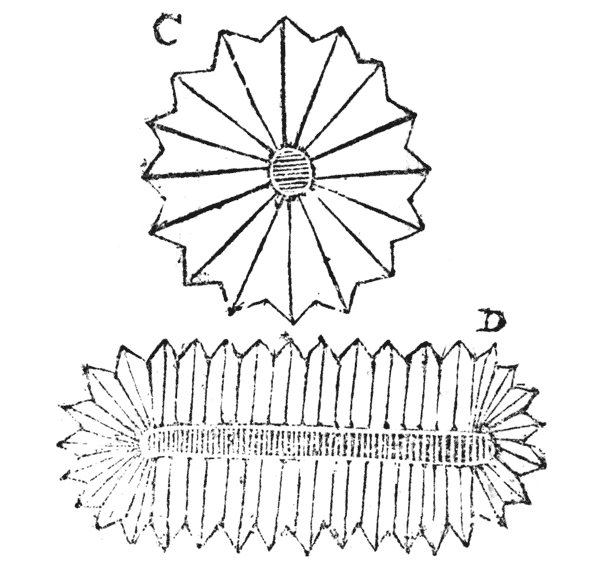
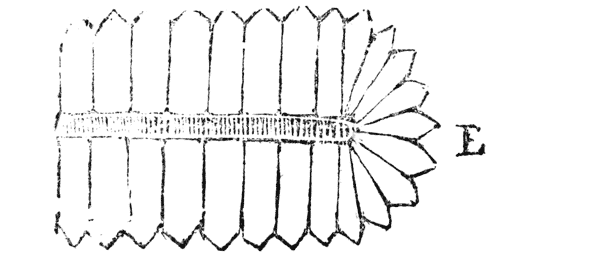
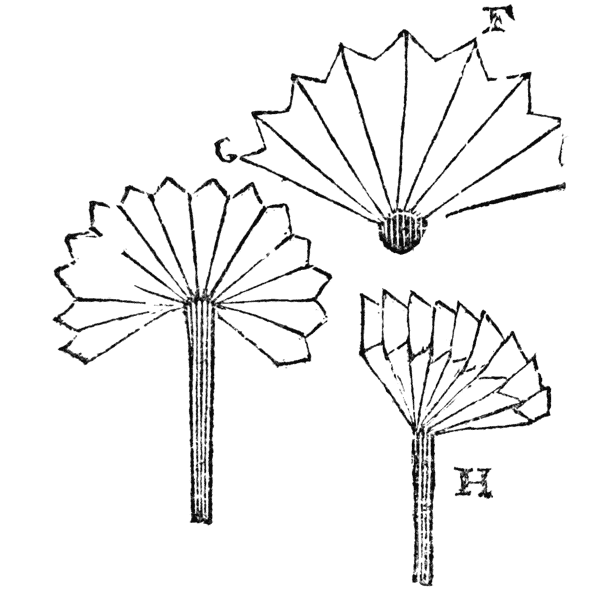
And I would have shewn more of the cuts, but that here is enough for the ingenious, since they have the manner of folding the paper, which is a great help to do it: the next fashion is a buttrice, such as farriers use to pair their horses heels withal; in the fashion of a lawyer’s desk; in the fashion of a bridge made of wood to carry a troop of horse over a river: in the fashion of a dark lanthorn: in the fashion of a bough-pot; in the fashion of a lanthorn with a rose at each end: in the fashion of a minced-pye, without any meat in it; in the fashion of a cardinal’s cap; in the fashion of a coster-monger’s cap; in the fashion of a sugar dish; and many more knacks to be played with it.
When you are in company, and shewing your tricks, and that you have done as many as you can, or think to do at this time, then say, to conclude, I will shew you the best and cleverest trick that ever I did shew in all my life; not only shew you, but learn it you, that you may do it yourself another time. The trick is this: how to set a glass of brandy on the other side of the table, and to make it come jumping and never touch it.
First, fill a glass of brandy, and put it on the farther end of the table, and have in readiness the crown of your hat blacked, then say to the company, gentlemen, whatever you see or hear, I desire you to say nothing; for this is done by the black art; now I desire every one of you to change hats one with another, and do as I do, and say as I say; now you must all turn the crowns of your hats towards your faces, and so speak as I do, saying, John of Basket; John of Basket! then rub your face, and he that hath your blacked hat, will laugh because the glass doth not move, and the others will laugh at his black face; and so you will make sport enough, then you must speak two or three bold words to the glass; as thus: glass of brandy, glass of brandy, come to me, if you will not, I will fetch you, and so take it up with your hand and drink it, then seem to fling the glass up against the cieling, and break it, and it will seem very strange. I have done this often.
This feat is one of the greatest that the jugglers have done, and is inferior to none. To do this, you must go to some tinman, or any body that knows how to make your holes room enough for a die to go in and out, and then let them clap a good half-penny upon them all, and so make them fast, and nobody can tell them from real ones; then you must get a cap to cover your half-pence, a cap and a die for the company to fling to amuse them; when you are thus provided with half-pence, a cap, and a die, the manner of performance is thus: desire any body in the company to lend you seven half-pence, telling them that you will soon return them their own again; then say, gentlemen, this is made just fit for your money; then clapping your cap on, desire somebody in the company to fling that die to see what they can fling, and in so doing, take off the cap and convey your false money into the cap, so that the company may not see you put it in, then with your cap cover the die, so with your right-hand take up the true money, and put it into the left under the table, saying, Vada, begone, I command the die to be gone, and the money to come in the place; so take up the cap, and the die is gone, and the money is come, covering the money again with the cap, so taking the true money in your right-hand, and knocking under the table, making a jingling as though the money was coming through the table, then flinging then on the table, say, there is the money, and with your right-hand take off the cap, saying, and there is the die; so convey the false money into your lap, and there is the cap likewise. This is an ingenious feat if well handled, here make the figure of a die, and the fashion of seven half-pence, and a cap to cover them.
You must have a box made on purpose, with a false lid; for to describe it to you in words, is pretty hard, but you may have them ready made at my house. This box must be turned nearly like unto the egg-boxes, so that they cannot find out where it opens, and you must have a false lid to clap on and off, and on that lid glew some bird seed; so before you shew the box, to the company, put a bird in the box, and then the false lid, then shew the box to the company, and it will seem to be full of seed, then say to the company, ‘gentlemen you see my box is full of seed;’ which nobody can tell to the contrary, then put your true lid on, saying, Gentlemen, I will command all the seed out of my box, and command a living bird to appear; so taking off the covers the bird will appear. You may be furnished with all manner of instruments, cups, Dutch puddings, egg-boxes, globe-boxes, melting-boxes, sixpenny-boxes, bird-boxes, and bells and bushels.
You must go and get a box turned of box-wood or any other wood which you fancy; you must have it turned with two lids, one must be a false one, and there put a counter, so that it may rattle; and you must have a small pegg, or button, to your box, to hinder the counter from jingling, and at the bottom of the box, which you have neatly turned, there you must have a half notch made in your box, just fit for a sixpence to come out. So to perform this feat, you must desire any body to lend you a sixpence, and to mark it with what they please, then let them put it into the box themselves, afterwards then put the cover on, then by shaking the box, the sixpence will come into your hand; then you may dispose of it as you know how when you are shewing your feats. This feat is not inferior to any that is shewn with boxes.
Note, This box you may have of me ready made in the new fashion.
Take the cards and shuffle them, or let any body else shuffle them, or lay down the whole pack on the table before you, with their faces downwards, then drawing off the upper card say, Here I call for the card of good luck; and when you have seen what that card is, which you must do as privately as you can, and be sure not to let the company see him, then say, Here I call for ———, naming your card of good luck, and so take the next uppermost card, and then having seen him, say, Here I call for the ———, naming the card you took up last, and so take off the next uppermost card, and thus still calling for the card you last took up, you may call for as many as you please; or, if you will, you may thus go round the pack, and, in the mean time, cause one to write down the names of the cards, in the same order as you call for them, which they may do in brief, thus by writing a figure for the number of the spots, as 1 for the ace, 2, 3, 4, 5, 6, and so to ten; and then kn. for the knave, q. for queen, and kg. for king, adding a letter for the suits viz. c. for clubs, s. for spades, h. for hearts, and d. for diamonds, e. g. is three or four cards; suppose the three first cards, called for, were, the ace of clubs, the tray of spades, and the five of diamonds, they be set down thus, 1 C——3 S—5 D, and so of any other: having thus gone round, with as many as you please, take them from the table, saying, Look now in your paper, see which card I call for first, which second, and which third, &c. and whilst he is looking, do you flip the card of good luck under the bottom of the pack, then holding the cards with their faces upwards, take them off one by one, and they will come in the same order as you called them, only the last card will not be set down in the paper, and it must be pretended he was the card of good luck.
After having privately seen the uppermost card, lay the cards down in three or four heaps, but not above, then begin at the heap farthest off from you, that has the known card on the top, and say, Here I call for the ———, naming the known card; then go to the next heap, saying, Here I call for the ———, naming the card you took up last; proceed in the same manner, viz. still naming the card you last took up, till you come to the last heap, so the card you call for first, will come last; but here note, you must keep the cards close that they may not be seen till you have done calling, and then you must lay them down, one by one, in the same order as you called them.
Take 21 cards, and begin to lay them down, three in a row, with their faces upwards, then begin again at the left-hand, and lay one card upon the first, and soon the right hand, and then begin at the left-hand again and so go on to the right, do this till you have laid out the 21 cards in three heaps, but as you are laying them out, bid any one think on a card, and when you have laid them all out, ask him in which heap his card is in, then lay the card in the middle betwixt the other two; then lay them all out again into three heaps, as before, and as you lay them out, bid him take notice where his noted card goes; when you have laid them all out, ask him in what heap it is now? put that heap in the middle as before, and lay out the cards a third time, bidding him take notice where his noted card goes, and put that heap in the middle as before; then taking the cards with their backs towards you, take off the uppermost card, smelling to him, reckon him 1, then take off another, and smelling him, reckon him 2, this do till you come to the eleventh card, for that will always be the noted card, after the third time of laying them out, though you should lay in this manner ever so often; you must never lay out the cards less than three times, but as often above as you please. This trick may be done by any odd number of cards that may be divided by three.
When one has noted a card, take it and put it at the bottom of the pack, then shuffle the cards till it come again to the bottom; then see what is the bottom card, for it is the noted card, which you may do without being taken notice of; thus, when you have shuffled the cards, turn them with their faces towards you, and nock their ends upon the table, as though you would knock them level; and whilst you are so doing, take notice of the bottom card, which you may do without suspicion, especially having shuffled them before; then when you know the card shuffle them again, and give them to any of the company, and let them shuffle them, for you know the card already, and may easily find it at any time.
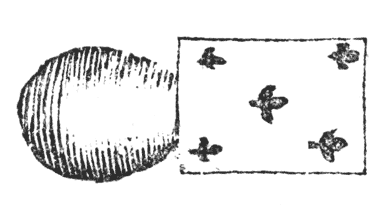
To do this wonderful feat, you must have two sticks made, both of one bigness, and both of a likeness, so that no person can know one from the other; one of the sticks must be made so artificially as to conceal a card in the middle, as thus: you must have one of your sticks turned hollow quite through, and then an artificial spring to throw the card in the egg, at your pleasure; the operation is thus: take and peel any card in the pack, which you please, and so roll it up, and then put it into your false stick, and there let it be till you have occasion to make use of it; then take a pack of cards, and let any body draw a card, but be sure let it be the same sort of card that you have in the stick already; then let them put it in the pack again, and when you are shuffling them, let that card fall into your lap, which the party drew, so calling for some eggs, desire that party that drew the card, or any person else in the company, to choose any one of these eggs, and when they have chosen one, ask them if there be any thing in it, and they will answer no; then take the egg in your left-hand, and your false stick in your right, and so break the egg with your stick, and then let the spring go, and the card will appear in the egg, very amazing to the beholders; then conceal that stick and produce the true one upon the table.
Take a vessel A. B. which has two bottoms, this is close on all sides like a drum; through the middle of it run a long pipe, C. D. sodered to the lower bottom at F, with its two ends open, C. D. the first of which C. must not quite touch the uppermost bottom, but leave passage for the water; when one has a mind to fill the vessel A. B. which is done by turning up the vessel A. B. with its pipe C. D. so that the hole D. will then be the uppermost, and pouring in the water at D. this done, stop up the pipe C. D. with another, and a very little smaller pipe E. D. that can just enter it, and is fixed in the bottom of a case or cistern that is a little longer than one of the two bottoms of the vessel A. B. the two pipes C. D. ought to have at an equal height, two appertures or holes I. I. and the smallest D. E. ought to be movable within the greater, C. D. that so you may turn the smaller with its case G. H. when you will, fill the two holes I. I. meet farther the vessel A. B. ought to have several little holes in its lower bottom, as K. L. for giving egress to the water, and the case or receptacle G. H. ought likewise to have smaller vent, M. N. for the water to run out. Now the vessel A. B. being filled with water as we directed but now, and the pipe C. D. being stopt by the pipe D. E. which is supposed so thin, that it could just fill it without any necessity of the extremity E. it reaching to the end C. provided the other two ends D. D. do but fit: is it done, I say, turning the vessel again to its first position, in which it will stand as in the figure, the case G. H. being its base, and being turned together with its pipe E. till the two vents I. I. meet and make but one orafice, for then the water contained in the vessel A. B. will run out at the vents K. L. as long as the air can pass through the apperture I. to supply the room of the water that runs A. B. into the case G. H. but when the water in the receptacle G. H. rises above the vent I. which will infallibly happen, since more water runs at the vents K. L. than at M. N. the former being supposed to be larger than the latter, the air not finding access at I. the water in the vessel A. B. will give over running through the vents K. L. but the water in the receptacle G. H. will continue to run at the vents M. N. so that this water will grow lower by degrees, till the vent I. is uncovered again, and then the air having access at I. will renew the flux of the water thro’ K. L. which in a small time will raise the water in the case G. H. so as to recover the vent I. again, upon which the stream A. B. will stop, and so on alternately, till there is no water in the vessel A. B.
This is called the fountain of command, because it runs at a word, when the water is near the renewal of its flux, thro’ the vents K. L. which is easily known; for when the vent I. begins to get clear of water in G. A. the air struggling for access at the vent makes a little noise, and so gives notice that the fountain is about to run. This is a merry device.
Take the seed of henbane, and give it the horse in his provender, and it will cast him into such a deep sleep, that he will seem dead; and if you will recover him again, rub his nostrils with vinegar, and he will be revived again.
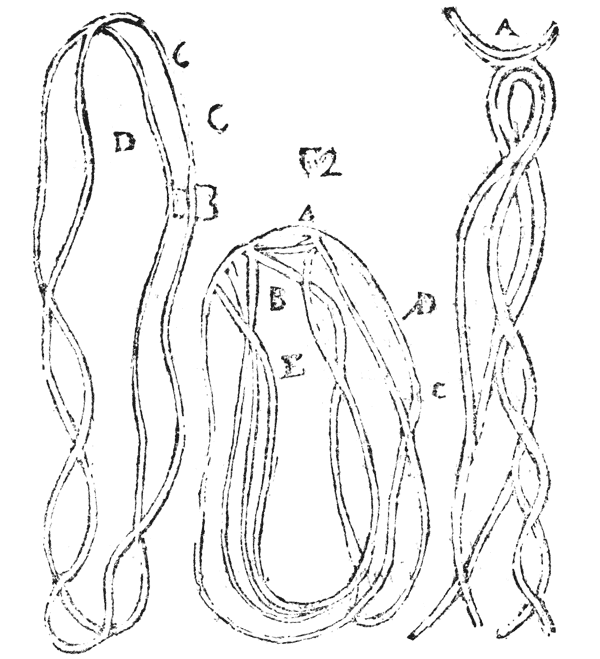
Take a piece of narrow white tape, about two or three yards long, first present it to view to any that may desire it; then tie both the ends of it together, and take one side of it in one hand, and the other in the other hand, so that the knot may be about the midst of one side, and using some circumstantial words to beguile your spectators, turn one hand about towards yourself, and the other from you, so shall you twist the tape once; then clap the ends together, and then if you slip your fore-finger and thumb of each hand between the tape, almost as one would hold a skane of thread to be wound, this will make one fold or twist, as appears where A signifieth the twist or fold; B the knot; then in like manner make a second fold, about the line D. C. as you may see by the second figure, where B. signifieth the knot, C. the first fold, A. the second fold: hold then the fore finger and thumb of your left hand upon the second twist and upon the knot also, and the fore-finger and thumb of your right hand upon the first fold C. and desire some one of your spectators to cut all asunder with a sharp knife, at the cross line E. D. when it is cut, hold still your left hand, and let all your ends fall, that you hold in your right hand, for there will be a shew of eight ends, four above and four below, and so the strings will be thought to be cut into four parts, as may be seen by the third figure; then gather up the ends that you let fall into your left hand, and deliver two of the ends, (seeming to take them at random) unto two several persons, binding them to hold them fast, still keeping your left hand fingers upon the twists or folds; then with your right and left hands seem to tumble all the ends together that you had in your left-hand, twist out the slips or pieces, which are three, as you may see at A. and B. in the third figure, twist them all I say, into a little ball, and conceal it between some of your fingers of your left hand, and crumble thereon another confused heap, and after some words said, with your right-hand deliver this confused heap unto any one of the company, biding him hold it fast, Hulla, Passa, then bid them look on it, who while they are greedily looking after the event, you with ease convey the ball or roll of ends into your pocket; so it will be thought that you have made it whole by virtue of your words. An excellent trick if it be gracefully handled; and a trick that cost me trouble to find.
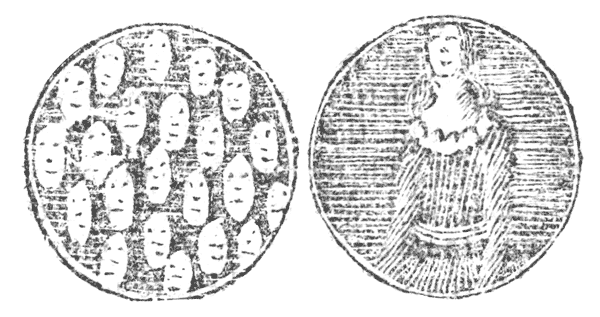
This feat must be performed by a looking-glass made on purpose, the figure whereof I have fully described, with the manner of making it, which is this; first make a hoop, or phillet of wood, horn, or such like, about the width of a half crown piece in the circumference; the thickness of this hoop, or phillet, let it be about a quarter of an inch; in the middle of this hoop fasten a bottom of wood or brass, and bore in a decent order, divers small holes, about the bigness of small pease, then open the one side of this bottom, set in a piece of crystal-glass, and fasten it in the hoop close to the bottom, then take a quantity of quick-silver, and put so much into the hoop as will cover the bottom; then let into the hoop another piece of chrystal-glass fitted thereto and cement the sides, that the quick-silver may not run out, and it is done; the figure whereof I have before set. A. presenteth the one side that giveth the form of one face to the beholders? B the other side that multiplieth the beholder’s face so oft as there are holes in the middle bottom. The use whereof I shall not insist upon, since he that is versed in the former feats will better conceive of himself to use it, than my words can either direct or assist him.
Take three parts of salt-petre, two parts of salt of tarter, and one part of sulpher, pounded and mixed together, heat in a spoon sixty grains of this composition, and it will fly away with a fearful noise, like thunder, as loud as a cannon, breaking through the spoon and every thing underneath it, for it exerts itself downwards, contrary to the nature of gun-powder.
I have here set down, KIND READER, not only all usual feats, that either myself have seen or heard of, but divers others also, which I am sure were never in print, nor as yet performed by any I could ever hear of except myself, and all to give thee thy full content; and note this from me, if you rightly understand this, there is not a trick that any juggler in the world can shew thee, but thou shalt be able to conceive after what manner it is performed.
Original spelling and grammar have been generally retained, with some exceptions noted below. The transcriber produced the cover image and hereby assigns it to the public domain. Original page images are available from the Library of Congress, at https://lccn.loc.gov/90101687.
End of the Project Gutenberg EBook of Hocus Pocus, by Henry Dean
*** END OF THIS PROJECT GUTENBERG EBOOK HOCUS POCUS ***
***** This file should be named 57217-h.htm or 57217-h.zip *****
This and all associated files of various formats will be found in:
http://www.gutenberg.org/5/7/2/1/57217/
Produced by RichardW and the Online Distributed Proofreading
Team at http://www.pgdp.net (This file was produced from
images generously made available by the Library of Congress)
Updated editions will replace the previous one--the old editions will
be renamed.
Creating the works from print editions not protected by U.S. copyright
law means that no one owns a United States copyright in these works,
so the Foundation (and you!) can copy and distribute it in the United
States without permission and without paying copyright
royalties. Special rules, set forth in the General Terms of Use part
of this license, apply to copying and distributing Project
Gutenberg-tm electronic works to protect the PROJECT GUTENBERG-tm
concept and trademark. Project Gutenberg is a registered trademark,
and may not be used if you charge for the eBooks, unless you receive
specific permission. If you do not charge anything for copies of this
eBook, complying with the rules is very easy. You may use this eBook
for nearly any purpose such as creation of derivative works, reports,
performances and research. They may be modified and printed and given
away--you may do practically ANYTHING in the United States with eBooks
not protected by U.S. copyright law. Redistribution is subject to the
trademark license, especially commercial redistribution.
START: FULL LICENSE
THE FULL PROJECT GUTENBERG LICENSE
PLEASE READ THIS BEFORE YOU DISTRIBUTE OR USE THIS WORK
To protect the Project Gutenberg-tm mission of promoting the free
distribution of electronic works, by using or distributing this work
(or any other work associated in any way with the phrase "Project
Gutenberg"), you agree to comply with all the terms of the Full
Project Gutenberg-tm License available with this file or online at
www.gutenberg.org/license.
Section 1. General Terms of Use and Redistributing Project
Gutenberg-tm electronic works
1.A. By reading or using any part of this Project Gutenberg-tm
electronic work, you indicate that you have read, understand, agree to
and accept all the terms of this license and intellectual property
(trademark/copyright) agreement. If you do not agree to abide by all
the terms of this agreement, you must cease using and return or
destroy all copies of Project Gutenberg-tm electronic works in your
possession. If you paid a fee for obtaining a copy of or access to a
Project Gutenberg-tm electronic work and you do not agree to be bound
by the terms of this agreement, you may obtain a refund from the
person or entity to whom you paid the fee as set forth in paragraph
1.E.8.
1.B. "Project Gutenberg" is a registered trademark. It may only be
used on or associated in any way with an electronic work by people who
agree to be bound by the terms of this agreement. There are a few
things that you can do with most Project Gutenberg-tm electronic works
even without complying with the full terms of this agreement. See
paragraph 1.C below. There are a lot of things you can do with Project
Gutenberg-tm electronic works if you follow the terms of this
agreement and help preserve free future access to Project Gutenberg-tm
electronic works. See paragraph 1.E below.
1.C. The Project Gutenberg Literary Archive Foundation ("the
Foundation" or PGLAF), owns a compilation copyright in the collection
of Project Gutenberg-tm electronic works. Nearly all the individual
works in the collection are in the public domain in the United
States. If an individual work is unprotected by copyright law in the
United States and you are located in the United States, we do not
claim a right to prevent you from copying, distributing, performing,
displaying or creating derivative works based on the work as long as
all references to Project Gutenberg are removed. Of course, we hope
that you will support the Project Gutenberg-tm mission of promoting
free access to electronic works by freely sharing Project Gutenberg-tm
works in compliance with the terms of this agreement for keeping the
Project Gutenberg-tm name associated with the work. You can easily
comply with the terms of this agreement by keeping this work in the
same format with its attached full Project Gutenberg-tm License when
you share it without charge with others.
1.D. The copyright laws of the place where you are located also govern
what you can do with this work. Copyright laws in most countries are
in a constant state of change. If you are outside the United States,
check the laws of your country in addition to the terms of this
agreement before downloading, copying, displaying, performing,
distributing or creating derivative works based on this work or any
other Project Gutenberg-tm work. The Foundation makes no
representations concerning the copyright status of any work in any
country outside the United States.
1.E. Unless you have removed all references to Project Gutenberg:
1.E.1. The following sentence, with active links to, or other
immediate access to, the full Project Gutenberg-tm License must appear
prominently whenever any copy of a Project Gutenberg-tm work (any work
on which the phrase "Project Gutenberg" appears, or with which the
phrase "Project Gutenberg" is associated) is accessed, displayed,
performed, viewed, copied or distributed:
This eBook is for the use of anyone anywhere in the United States and
most other parts of the world at no cost and with almost no
restrictions whatsoever. You may copy it, give it away or re-use it
under the terms of the Project Gutenberg License included with this
eBook or online at www.gutenberg.org. If you are not located in the
United States, you'll have to check the laws of the country where you
are located before using this ebook.
1.E.2. If an individual Project Gutenberg-tm electronic work is
derived from texts not protected by U.S. copyright law (does not
contain a notice indicating that it is posted with permission of the
copyright holder), the work can be copied and distributed to anyone in
the United States without paying any fees or charges. If you are
redistributing or providing access to a work with the phrase "Project
Gutenberg" associated with or appearing on the work, you must comply
either with the requirements of paragraphs 1.E.1 through 1.E.7 or
obtain permission for the use of the work and the Project Gutenberg-tm
trademark as set forth in paragraphs 1.E.8 or 1.E.9.
1.E.3. If an individual Project Gutenberg-tm electronic work is posted
with the permission of the copyright holder, your use and distribution
must comply with both paragraphs 1.E.1 through 1.E.7 and any
additional terms imposed by the copyright holder. Additional terms
will be linked to the Project Gutenberg-tm License for all works
posted with the permission of the copyright holder found at the
beginning of this work.
1.E.4. Do not unlink or detach or remove the full Project Gutenberg-tm
License terms from this work, or any files containing a part of this
work or any other work associated with Project Gutenberg-tm.
1.E.5. Do not copy, display, perform, distribute or redistribute this
electronic work, or any part of this electronic work, without
prominently displaying the sentence set forth in paragraph 1.E.1 with
active links or immediate access to the full terms of the Project
Gutenberg-tm License.
1.E.6. You may convert to and distribute this work in any binary,
compressed, marked up, nonproprietary or proprietary form, including
any word processing or hypertext form. However, if you provide access
to or distribute copies of a Project Gutenberg-tm work in a format
other than "Plain Vanilla ASCII" or other format used in the official
version posted on the official Project Gutenberg-tm web site
(www.gutenberg.org), you must, at no additional cost, fee or expense
to the user, provide a copy, a means of exporting a copy, or a means
of obtaining a copy upon request, of the work in its original "Plain
Vanilla ASCII" or other form. Any alternate format must include the
full Project Gutenberg-tm License as specified in paragraph 1.E.1.
1.E.7. Do not charge a fee for access to, viewing, displaying,
performing, copying or distributing any Project Gutenberg-tm works
unless you comply with paragraph 1.E.8 or 1.E.9.
1.E.8. You may charge a reasonable fee for copies of or providing
access to or distributing Project Gutenberg-tm electronic works
provided that
* You pay a royalty fee of 20% of the gross profits you derive from
the use of Project Gutenberg-tm works calculated using the method
you already use to calculate your applicable taxes. The fee is owed
to the owner of the Project Gutenberg-tm trademark, but he has
agreed to donate royalties under this paragraph to the Project
Gutenberg Literary Archive Foundation. Royalty payments must be paid
within 60 days following each date on which you prepare (or are
legally required to prepare) your periodic tax returns. Royalty
payments should be clearly marked as such and sent to the Project
Gutenberg Literary Archive Foundation at the address specified in
Section 4, "Information about donations to the Project Gutenberg
Literary Archive Foundation."
* You provide a full refund of any money paid by a user who notifies
you in writing (or by e-mail) within 30 days of receipt that s/he
does not agree to the terms of the full Project Gutenberg-tm
License. You must require such a user to return or destroy all
copies of the works possessed in a physical medium and discontinue
all use of and all access to other copies of Project Gutenberg-tm
works.
* You provide, in accordance with paragraph 1.F.3, a full refund of
any money paid for a work or a replacement copy, if a defect in the
electronic work is discovered and reported to you within 90 days of
receipt of the work.
* You comply with all other terms of this agreement for free
distribution of Project Gutenberg-tm works.
1.E.9. If you wish to charge a fee or distribute a Project
Gutenberg-tm electronic work or group of works on different terms than
are set forth in this agreement, you must obtain permission in writing
from both the Project Gutenberg Literary Archive Foundation and The
Project Gutenberg Trademark LLC, the owner of the Project Gutenberg-tm
trademark. Contact the Foundation as set forth in Section 3 below.
1.F.
1.F.1. Project Gutenberg volunteers and employees expend considerable
effort to identify, do copyright research on, transcribe and proofread
works not protected by U.S. copyright law in creating the Project
Gutenberg-tm collection. Despite these efforts, Project Gutenberg-tm
electronic works, and the medium on which they may be stored, may
contain "Defects," such as, but not limited to, incomplete, inaccurate
or corrupt data, transcription errors, a copyright or other
intellectual property infringement, a defective or damaged disk or
other medium, a computer virus, or computer codes that damage or
cannot be read by your equipment.
1.F.2. LIMITED WARRANTY, DISCLAIMER OF DAMAGES - Except for the "Right
of Replacement or Refund" described in paragraph 1.F.3, the Project
Gutenberg Literary Archive Foundation, the owner of the Project
Gutenberg-tm trademark, and any other party distributing a Project
Gutenberg-tm electronic work under this agreement, disclaim all
liability to you for damages, costs and expenses, including legal
fees. YOU AGREE THAT YOU HAVE NO REMEDIES FOR NEGLIGENCE, STRICT
LIABILITY, BREACH OF WARRANTY OR BREACH OF CONTRACT EXCEPT THOSE
PROVIDED IN PARAGRAPH 1.F.3. YOU AGREE THAT THE FOUNDATION, THE
TRADEMARK OWNER, AND ANY DISTRIBUTOR UNDER THIS AGREEMENT WILL NOT BE
LIABLE TO YOU FOR ACTUAL, DIRECT, INDIRECT, CONSEQUENTIAL, PUNITIVE OR
INCIDENTAL DAMAGES EVEN IF YOU GIVE NOTICE OF THE POSSIBILITY OF SUCH
DAMAGE.
1.F.3. LIMITED RIGHT OF REPLACEMENT OR REFUND - If you discover a
defect in this electronic work within 90 days of receiving it, you can
receive a refund of the money (if any) you paid for it by sending a
written explanation to the person you received the work from. If you
received the work on a physical medium, you must return the medium
with your written explanation. The person or entity that provided you
with the defective work may elect to provide a replacement copy in
lieu of a refund. If you received the work electronically, the person
or entity providing it to you may choose to give you a second
opportunity to receive the work electronically in lieu of a refund. If
the second copy is also defective, you may demand a refund in writing
without further opportunities to fix the problem.
1.F.4. Except for the limited right of replacement or refund set forth
in paragraph 1.F.3, this work is provided to you 'AS-IS', WITH NO
OTHER WARRANTIES OF ANY KIND, EXPRESS OR IMPLIED, INCLUDING BUT NOT
LIMITED TO WARRANTIES OF MERCHANTABILITY OR FITNESS FOR ANY PURPOSE.
1.F.5. Some states do not allow disclaimers of certain implied
warranties or the exclusion or limitation of certain types of
damages. If any disclaimer or limitation set forth in this agreement
violates the law of the state applicable to this agreement, the
agreement shall be interpreted to make the maximum disclaimer or
limitation permitted by the applicable state law. The invalidity or
unenforceability of any provision of this agreement shall not void the
remaining provisions.
1.F.6. INDEMNITY - You agree to indemnify and hold the Foundation, the
trademark owner, any agent or employee of the Foundation, anyone
providing copies of Project Gutenberg-tm electronic works in
accordance with this agreement, and any volunteers associated with the
production, promotion and distribution of Project Gutenberg-tm
electronic works, harmless from all liability, costs and expenses,
including legal fees, that arise directly or indirectly from any of
the following which you do or cause to occur: (a) distribution of this
or any Project Gutenberg-tm work, (b) alteration, modification, or
additions or deletions to any Project Gutenberg-tm work, and (c) any
Defect you cause.
Section 2. Information about the Mission of Project Gutenberg-tm
Project Gutenberg-tm is synonymous with the free distribution of
electronic works in formats readable by the widest variety of
computers including obsolete, old, middle-aged and new computers. It
exists because of the efforts of hundreds of volunteers and donations
from people in all walks of life.
Volunteers and financial support to provide volunteers with the
assistance they need are critical to reaching Project Gutenberg-tm's
goals and ensuring that the Project Gutenberg-tm collection will
remain freely available for generations to come. In 2001, the Project
Gutenberg Literary Archive Foundation was created to provide a secure
and permanent future for Project Gutenberg-tm and future
generations. To learn more about the Project Gutenberg Literary
Archive Foundation and how your efforts and donations can help, see
Sections 3 and 4 and the Foundation information page at
www.gutenberg.org Section 3. Information about the Project Gutenberg
Literary Archive Foundation
The Project Gutenberg Literary Archive Foundation is a non profit
501(c)(3) educational corporation organized under the laws of the
state of Mississippi and granted tax exempt status by the Internal
Revenue Service. The Foundation's EIN or federal tax identification
number is 64-6221541. Contributions to the Project Gutenberg Literary
Archive Foundation are tax deductible to the full extent permitted by
U.S. federal laws and your state's laws.
The Foundation's principal office is in Fairbanks, Alaska, with the
mailing address: PO Box 750175, Fairbanks, AK 99775, but its
volunteers and employees are scattered throughout numerous
locations. Its business office is located at 809 North 1500 West, Salt
Lake City, UT 84116, (801) 596-1887. Email contact links and up to
date contact information can be found at the Foundation's web site and
official page at www.gutenberg.org/contact
For additional contact information:
Dr. Gregory B. Newby
Chief Executive and Director
[email protected]
Section 4. Information about Donations to the Project Gutenberg
Literary Archive Foundation
Project Gutenberg-tm depends upon and cannot survive without wide
spread public support and donations to carry out its mission of
increasing the number of public domain and licensed works that can be
freely distributed in machine readable form accessible by the widest
array of equipment including outdated equipment. Many small donations
($1 to $5,000) are particularly important to maintaining tax exempt
status with the IRS.
The Foundation is committed to complying with the laws regulating
charities and charitable donations in all 50 states of the United
States. Compliance requirements are not uniform and it takes a
considerable effort, much paperwork and many fees to meet and keep up
with these requirements. We do not solicit donations in locations
where we have not received written confirmation of compliance. To SEND
DONATIONS or determine the status of compliance for any particular
state visit www.gutenberg.org/donate
While we cannot and do not solicit contributions from states where we
have not met the solicitation requirements, we know of no prohibition
against accepting unsolicited donations from donors in such states who
approach us with offers to donate.
International donations are gratefully accepted, but we cannot make
any statements concerning tax treatment of donations received from
outside the United States. U.S. laws alone swamp our small staff.
Please check the Project Gutenberg Web pages for current donation
methods and addresses. Donations are accepted in a number of other
ways including checks, online payments and credit card donations. To
donate, please visit: www.gutenberg.org/donate
Section 5. General Information About Project Gutenberg-tm electronic works.
Professor Michael S. Hart was the originator of the Project
Gutenberg-tm concept of a library of electronic works that could be
freely shared with anyone. For forty years, he produced and
distributed Project Gutenberg-tm eBooks with only a loose network of
volunteer support.
Project Gutenberg-tm eBooks are often created from several printed
editions, all of which are confirmed as not protected by copyright in
the U.S. unless a copyright notice is included. Thus, we do not
necessarily keep eBooks in compliance with any particular paper
edition.
Most people start at our Web site which has the main PG search
facility: www.gutenberg.org
This Web site includes information about Project Gutenberg-tm,
including how to make donations to the Project Gutenberg Literary
Archive Foundation, how to help produce our new eBooks, and how to
subscribe to our email newsletter to hear about new eBooks.